
R75.00 Incl. VAT 9772411292008 23010 Information | Innovation | Inspiration | Transformation SPECIAL SECTION RBIDZ: UNLOCKING INVESTMENT OPPORTUNITIES IN SA MAXIMISING LAND USE TO BETTER SUPPORT INDUSTRY & SOCIETY Public-private partnerships to alleviate water issues A BUSINESS INTERACTION PUBLICATION Volume 9 | Issue 3 | July 2023 THE FUTURE OF PEOPLE ANALYTICS Women in Leadership COVER FEATURE SINAYO SECURITIES: DELIVERING SOLUTIONS & INSTILLING CONFIDENCE Babalwa Ngonyama


Follow

us...
South
There is a lot of negativity in the news, and rightly so. Knowing the "bad news" is not all bad. True innovators know that "bad news" or challenges is an opportunity to find solutions. It's when things go wrong that we have the opportunity to improve efficiencies.
While the above does ring true for many, a key blockage occurs in engagement, proactive collaboration and red tape. Competition is healthy, but sometimes when facing challenges in order to find cost-efficient and effective solutions requires partnership.

From a resource perspective, there are challenges, but we are fortunate that we do have skilled and innovative minds. To tap into this we need effective leadership across the board – business (private sector), government, communities, think tanks and also the education sector.

Diversity plays a key role in unlocking solutions. Diversity comes in many forms be it orientation, age, sex etc. Different mindsets impact change. Over the years we have witnessed the impact women have made in business and society. The first step towards this was embracing a culture of diversity and inclusivity. Tashne

Embracing diversity @SABImagazine
NOTE Eds
African Business Integrator R2500 FROM www.ixist.co.za info@ixist.co.za BUILD YOURdream WE'LL BUILD YOUR website Get a professional website up and running in no time and share your ideas with the world.
TASHNE SINGH














































































































Botswana’s mining potential with EPCM expertise
80 Q&A: M84 Geotech
M84 Geotech making mining safer
84 The crisis we won’t see coming – planning for over-urbanisation
88 Demand for residential rentals up in first quarter of 2023
92 Small businesses need help to survive weak rand


104 From fraud to fortification: strengthening hiring processes to prevent the need to litigate
108 Advertorial: BCX
A digital-first mindset reimagines agility and resilience
120 Weighing up air travel, car rental, and rail travel for your next business trip
124 The future of AI in the hospitality industry

127 Profile: Probe IMT Group
Leading integrated solutions for productivity and safety
4 sabusinessintegrator.co.za CONTENTS 38 Alarming trends in the SME road freight sector 41 Advertorial: Unitrans Unitrans demonstrates commitment to continent with a growing footprint and suite of services 44 Shipping losses hit a record low in 2022 48 Turning SA’s SEZs into energy ecosystems 52 Q&A: Richards Bay Industrial Development Zone (RBIDZ) Unlocking investment opportunities in SA 56 Advertorial: Aims International Adapt or perish: a guide to upskilling in the digital age 58 EWSETA launches an African-first hydrogen course 64 Maximising land use to better support industry and society 8 16 Q&A: SAWITA Pulane Shomang: Helping to put SA's film/TV industry on the global map 20 Q&A: Ithuba Charmaine Mabuza, CEO Ithuba (RF) (PTY) LTD 22 Promoting diversity 24 Q&A: Celéste Burger Strategic marketing enables growth 26 Profile: Zinto Unlock leadership potential 28 Profile: The Transformation Legacy Breaking barriers 32 Q&A: Ocean Basket Group Focus, simplicity and courage 36 Profile: Ask Africa Sarina De Beer: An influential leader in benchmark research, shaping industries SPECIAL SECTION: WOMEN IN LEADERSHIP 8 Cover Feature: Sinayo Securities Delivering creative solutions and instilling confidence
The citrus industry can flourish, even while facing challenges
114
Public-private partnerships to alleviate water issues
Q&A: Probe IMT Group Making mining smarter
Unlocking
66
58
70
74
76
94 South Africa's potential copyright calamity 96 Future of financial planning 98 Talent shortage in the auditing industry
102 Increase in maximum monetary fines for auditors
110 IT leads prepare for ‘business unusual’ in the event of grid failure
114 The future of people analytics
116 SA’s NHI: The ‘Eskom’ of healthcare




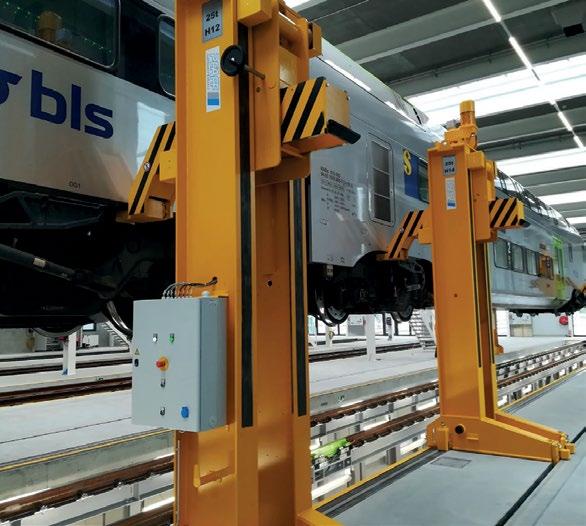
FOR ALL YOUR LIFTING REQUIREMENTS Tel 011 794 2910 Email info@yalelift.co.za (General) | crm@yalelift.co.za (Sales) www.yale.co.za INDUSTRIAL HOISTING EQUIPMENT ASSET & INSPECTION MANAGEMENT SOLUTIONS ON-SITE SERVICE & EXPERT TRAINING ENGINEERED PRODUCTS & SERVICES
CREDITS
South African Business Integrator


PUBLISHER
Elroy van Heerden-Mays elroy@mediaxpose.co.za
EDITOR
Tashne Singh editor@sabusinessintegrator.co.za
SUB-EDITOR
Tessa O’Hara tessa.ohara@gmail.com
CONTENT MANAGER
Wadoeda Adams artwork@mediaxpose.co.za
DESIGNERS
Anja Bramley artwork1@mediaxpose.co.za
Shaun van Heerden-Mays artwork2@mediaxpose.co.za
EDITORIAL CONTRIBUTORS
Verona Oliver
Michelle Combrinck
Allianz
Viren Sookhun
COVER
IMAGES
DISTRIBUTION
Media Support | On the Dot
PUBLISHED BY
6 Carlton Crescent, Parklands, 7441
Tel: 021 424 3625 Fax: 086 544 5217
E-mail: info@sabusinessintegrator.co.za
Website: www.mediaxpose.co.za
Disclaimer: The views expressed in this publication are not necessarily those of the publisher or its agents. While every effort has been made to ensure the accuracy of the information published, the publisher does not accept responsibility for any error or omission contained herein. Consequently, no person connected with the publication of this journal will be liable for any loss or damage sustained by any reader as a result of action following statements or opinions expressed herein. The publisher will give consideration to all material submitted, but does not take responsibility for damage or its safe return.
EWSETA
Karen King
Justin Chadwick
Gap Infrastructure Corporation
Joshua Leroni
Carla Collett
The Financial Planning Institute of Southern Africa
ADVERTISING SALES MANAGER


Bill Tomazin
Kim Rew
Matt Williams
Elmen Lamprecht
Johan Biermann
Astrino Nicoloudakis
Dhevarsha Ramjettan
Mbali Nkosi

Bianca Rutherfoord-Jones
Lutendo Raulinga
Rashieda Wyngaardt rashieda@sabusinessintegrator.co.za
ADVERTISING SALES
Jacqueline-Ann Marsh jacqui@mediaxpose.co.za
MEDIA PARTNERSHIPS
Maurisha Niewenhuys maurisha@mediaxpose.co.za
DIGITAL MARKETING
Jay-Dee van Rensburg digital@mediaxpose.co.za
SOCIAL MEDIA CO-ORDINATOR
Kyla van Heerden social@mediaxpose.co.za
DISTRIBUTION & SUBSCRIPTIONS
Shihaam Gyer distribution@mediaxpose.co.za
CHIEF FINANCIAL OFFICER
Shaun van Heerden-Mays shaun@mediaxpose.co.za
ADMIN ASSISTANT
Ketsia Makola ketsia@mediaxpose.co.za
WEBSITE DEVELOPER/ADMINISTRATOR
Justin McGregor justin@mediaxpose.co.za
RECEPTION
Daniëla Daniels receptionist@mediaxpose.co.za
Image credits: 123rf.com South African Business Integrator VOL ISSUE 3 July 2023 www.sabusinessintegrator.co.za R75.00 Incl. VAT 9772411292008 23010 Information Innovation | Inspiration | Transformation SPECIAL SECTION RBIDZ: UNLOCKING INVESTMENT OPPORTUNITIES IN SA MAXIMISING LAND USE TO BETTER SUPPORT INDUSTRY & SOCIETY Public-private partnerships to alleviate water issues A BUSINESS INTERACTION PUBLICATION Volume 9 Issue 3 July 2023 THE FUTURE OF PEOPLE ANALYTICS Women in Leadership COVER FEATURE SINAYO SECURITIES: DELIVERING SOLUTIONS & INSTILLING CONFIDENCE Babalwa Ngonyama
@SABImagazine
A BUSINESS INTERACTION PUBLICATION
6
sabusinessintegrator.co.za
Babalwa Ngonyama – Sinayo Securities (Pty) Ltd
Since Serving 1909
Formed in 1909, The South African Institute of Electrical Engineers sports ± 6000 engineering professionals.

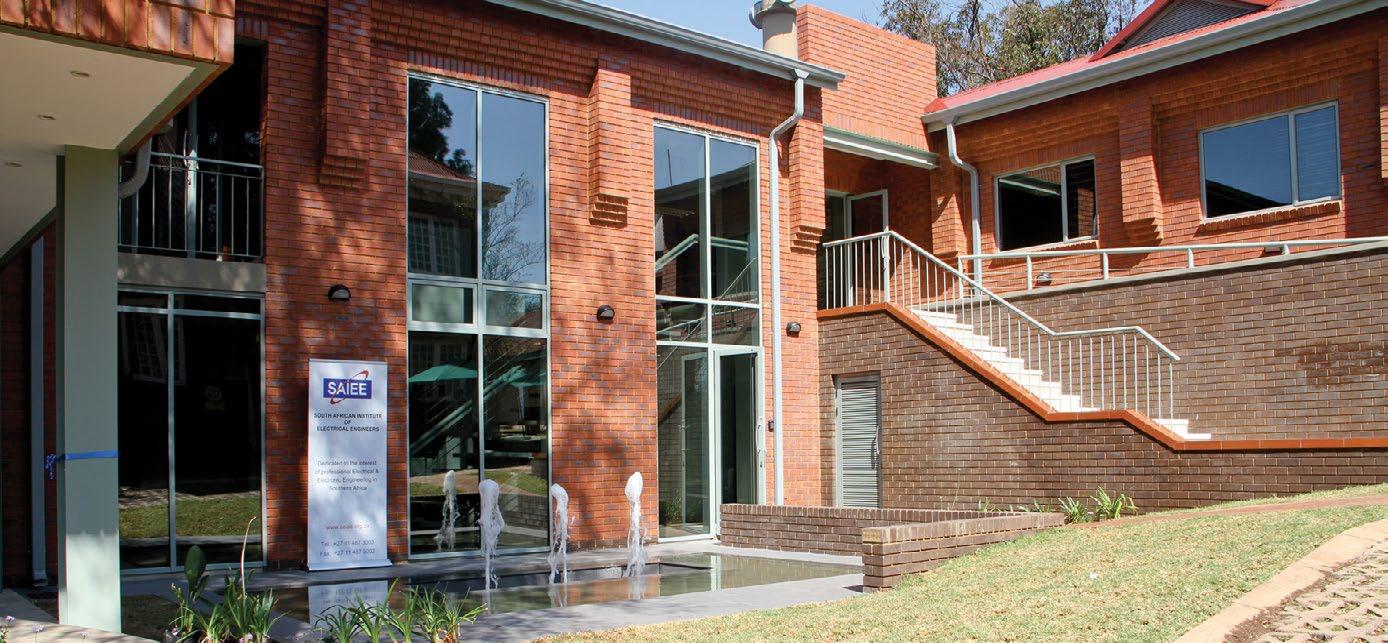
Why Join Us
Our members are professionally engaged in various engineering activities, including academic research, manufacturing, electronics, telecommunications, measurement and control, mining, and power infra-structural services. Members make meaningful contributions to the quality of life in communities and the steady advancement of technology. Their efforts are acknowledged in many countries worldwide.
Our
Purpose
SAIEE
Skills Development
One of our core objectives is to harness and foster the growth of Education in the Engineering sector, which has been faced with a debilitating shortage of skills.
Corporate Forums
Corporates are invited to monthly forum meetings to discuss and brainstorm critical issues in South Africa and find solutions.
Contact Us www.saiee.org.za 011 487 3003
To enhance the practice of electrical engineering in South Africa and the stature of our members through knowledge, networking, influence, education and communication. House, 18A Gill Street, Observatory, JHB
Training Academy
We offer CPD training courses, a powerful learning tool to improve skills, ensuring that academic qualifications do not become outdated.
Delivering creative solutions and
instilling confidence
Sinayo Securities (Pty) Ltd (Sinayo) is a South African, independent, majority-black female-owned stockbroker and member of the JSE Limited. Providing topquality securities services to institutional investors in South Africa and specializing in JSE-listed equity sales and trading, the company is an agency-only securities business. CEO, Babalwa Ngonyama, tells us more...

COMBINATION OF LOGO OPTION

COVER FEATURE: SINAYO SECURITIES
1 AND LOGO OPTION 3
8 sabusinessintegrator.co.za WOMEN IN LEADERSHIP
Tell us about the company’s journey. To get it here has been quite a ride, one that I believe has been accomplished due to the quality of the service and seamless solutions we offer to our clients.
We resolved quite early on that, to establish a sustainable franchise one had to assemble an experienced team of data scientists, economists, stockbrokers, and strategists. I am proud to claim that our team has been actively engaged in the JSE and financial markets for the last three decades. This depth of skill and understanding ensures that we comply with regulations and handle trade, risk, and settlement activities as a matter of course.
We now serve some of the top asset managers in the country, and this is a huge milestone for us.
We also diversified our activities by investing in complimentary businesses that include Constellation (a derivatives business), Optimize (a securities lending business), and Camissa Asset Management.
How does being a majority black femaleowned business impact the business? There are certain ways in which men approach business, and we bring a different perspective to the financial services industry which enhances the traditional way of how business is done.
Making clients believe in us has been a challenging task. We’ve had to deliver multiple presentations, engaging potential clients and convincing them of our capabilities, which was twice as much effort as what a typical male-led business would have had to do.
These challenges have, made us stronger, built resilience, and provided us with the platform to be focused on execution excellence.
We had to be very clear about our purpose and “why we are here”. We focused more on developing the team and its dynamics and tapped into each other’s strengths as a team. Cooperation is one of the values we treasure at Sinayo. We
ensure that each member plays an important role in a team. We value inclusivity. Our diverse nature comes in handy in solving clients’ problems.
Tell us a bit about Sinayo's operations. We provide top-quality securities trading services to pension funds and asset managers in South Africa, specialising in JSE-listed equity sales and trading.
In addition, we hold strategic equity interests in Optimize and Sinayo Wealth. Optimize provides us with scrip lending capabilities and through Sinayo Wealth we offer qualitative Environmental Social and Governance (ESG), quantitative research, including trading idea research. Our partnership with Software Design provides transactional cost analysis for the Sinayo Securities team.
Our vision is to develop innovative solutions that provide access to investment for all. Our mission is to provide our clients and portfolio companies with extraordinary insights, which generate tangible impact and enduring wealth when implemented. To deliver on our objectives, we:
• Provide exceptional client service through the best execution and by being insightful responsive and connected.
• Add value to our clients by providing quality Environmental Social and Governance “ESG”), quantitative, and thematic research including trading idea research.
• Provide executive access to our clients through theme-driven events.
• Reflect transformation through the diversity and values of the organisation.
• Foster transformation by training and mentoring talented black students/graduates.
• Leverage the brokerage platform to form meaningful relationships and drive sustainable growth.
We pride ourselves in our unique thinking process, and believe that with the right partnerships we can enable change in the financial landscape by offering
COVER FEATURE: SINAYO SECURITIES
9 sabusinessintegrator.co.za
a unique range of tools to our clients.
Our Sub-Saharan Africa reach offers execution in 11 African countries, Botswana, BRVM, Ghana, Kenya, Mauritius, Namibia, Nigeria, Rwanda, Tanzania, Uganda, and Zimbabwe.
Our vast knowledge, coupled with the latest technology, allows us to timeously execute and efficiently price transitions. We offer competitive brokerage rates depending on the size and frequency of trades. We offer electronic routing for Care Orders, Direct Market Access (DMA), and Algorithmic trading on the Iress Pro and Instinet systems.
Considering the realities, how has this impacted the appetite for investment?
The appetite for investing in South Africa is low at the present moment, given the recent greylisting, the economic headwinds, the electricity supply disruption and infrastructure challenges, and competition from other emerging markets.
We cannot give up. We believe at Sinayo that each country has its own challenges and businesses and citizens have a role to play in solving some of the country’s challenges.
Sinayo Securities positions itself as a local partner that understands the local dynamics that affect investment returns. We assist investors to understand and appreciate the risks and opportunities the country is facing, leading them to make better financial decisions. We have a network of experts that assist our clients with analysis of the South African environment. We assist our clients identify and seize opportunities in this changing world.
How do you see the next few years unfolding for investors?
With regards to opportunities, we are very close to the crest of the interest rate cycle, expecting the first decline in early 2024. South African equities and bonds are cheaply priced in the international
context. The South African 10-year bond is currently yielding 10.7%. This is quite attractive if one considers that the Reserve Bank is targeting medium-term inflation of around 5%.
The high inflation level of 7% driven by higher fuel costs and currency depreciation is, on the back of successive interest rate hikes by the Reserve Bank, expected to slow down over the next 18 months and we believe the inflation target range will be reached in the coming year.
Declining interest rates will yield equity gains. The average Forward Price/Earnings multiple on the equity market over the past 10 years is around 14.5x. We are currently at 10.6x. We believe that both equities and bonds will be able to generate returns in excess of 15% for at least the next two years. As interest rates abate, growth will be stimulated and opportunities in other areas such as private equity, infrastructure development, and ESG will also gather momentum.
Although ESG principles have been around for many years internationally, South Africa is somewhat behind the curve, but catching up fast. New legislation by the JSE to regulate the way corporates report on their ESG initiatives will greatly improve the visibility and availability of data to improve the assessment of progress.
Sinayo’s research division embarked on a process of ranking listed companies on their ESG credentials. The process uses both third-party scores and primary ESG data points. The listed companies which focused on improving their ESG credentials have materially outperformed.
With regards to the challenges, South Africa confronts numerous challenges that to some extent explain why our financial markets are cheaply priced. These challenges include the energy crisis, political foreign policies, crime, unemployment, and the brain drain.
We need to make South Africa attractive for our young, qualified people to remain here and make an active contribution to the economy. Pro-growth
10 sabusinessintegrator.co.za
FEATURE: SINAYO SECURITIES
COVER
economic policies will greatly address most of these challenges.
From a research perspective, the availability of data on especially ESG initiatives remains a challenge. We believe that with the implementation of the JSE’s reporting regulation on ESG, the ability to assess companies will improve greatly.
What are Sinayo's future growth plans?
We aim to grow our reach internationally, bringing in new products and services for our clients, and growing our focus on ESG.
We focus on covering the financial markets from a broader macro point of view, using quantitative and qualitative techniques to research and valuate assets both locally and internationally.
Due to the changes in regulation in early 2023, South African pension funds can now invest 45% of their assets offshore. This has increased demand for international research which we have now incorporated into our research product range.
Allocations to alternative investments and infrastructure projects have also increased to 15% and 45% respectively, opening the door to consider the launch of a private equity fund.
Another area of importance is ESG, which we believe is here to stay and will only grow in its importance. We currently offer a quantitative ESG ranking for South African listed companies, but we are in the process of developing a qualitative product on listed companies that can also be used to analyse private equity opportunities.
Motivation to enter finance
I entered finance to challenge the status quo that existed in the industry and bring a balance from a gender perspective. Secondly, finance is at the centre of our economy and economic development. To play a meaningful role in this space matters for our society and the financial sector enables me to do that. At Sinayo, we preserve people’s wealth. So, how we buy and sell shares is important to the livelihood of pensioners – the men and women in the street. Playing your part and having an impact on society is fulfilling.
Lessons learned
Failure is inevitable, but how you navigate and respond to your challenges is what matters.
Success is painful and a successful leader has a lot of scars. It’s through cooperation and working with your team that you stand a chance to succeed and go far.
Building strong relationships with funders goes a long way. People want to give money to someone they can trust. So, building trust and showing
integrity comes a long way. You can have clients but without integrity, you can’t go far.
Notes on entrepreneurship and leadership
Being and entrpreneur and leader requires sound perception, insight, and believing in and knowing yourself. Be less concerned about what society thinks of you, know what you really are, and continue to challenge yourself and raise your game.
Don't be afraid of change. Once you embrace change, you improve your ability to see opportunities brought by the changing landscape. There are always opportunities in a changing environment. We invest in understanding the change and execute with speed so that we stay ahead. Many people who are afraid of change never adapt, hence they get left behind.
Lastly, a positive attitude is crucial for an entrepreneur. We live in hope and faith in our abilities and those of others. If hope disappears, forget about moving forward. More importantly, you must surround yourself with astute and positive people.
11 sabusinessintegrator.co.za COVER FEATURE: SINAYO SECURITIES
Straight talk with Babalwa Ngonyama


Sinayo Securities (Pty) Ltd. (Sinayo) is the leading South African, independent, majority-black female-owned stockbroker and member of the Johannesburg Stock Exchange (JSE).

Sinayo’s vision and leadership are focused on the ambition to drive a legacy of sustainable transformation and inclusivity in the South African stock broking industry. Central to this vision is the continued growth of a sustainable and valued business offering our clients high-quality differentiated products, services and tailored solutions.

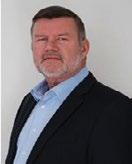
We built our business on the foundation of experience individuals with a strong entrepreneurial spirit, combined with the formation of longstanding and impactful client relationships.

Inclusion is not a matter of political correctness; it is the key to growth and competitive advantage. Diversity and inclusion, which are the real grounds for creativity and innovation, remain at the centre of what we do.
We have an experienced team of experts including data scientists, economists, stockbrokers, and strategists. We are proud that our team has been actively engaged in the JSE and financial markets for the last three decades. The depth of their skills and understanding ensures that we comply with regulations and handle trade, risk, and settlement activities as a matter of course.
Key to our strategy is the delivery of creative solutions that transform potential into favourable prospects, while instilling confidence and inspiring our clients.
With Project Funda, we recognise and develop talent in research and leadership in the financial services industry.
Through supporting 180 children at the Golden Ark Care Centre in Soweto, Sinayo ensures that all learners go to school with full stomachs, ready to learn and make the most of the day ahead.
Sinayo Securities (Pty) Ltd
+27 11 783 6599 l info@sinayo.co.za
www.sinayo.co.za
15th Annual Leadership Development For Woman
In Government & State Owned Enterprises, Conference & Career Expo
Date: 26 - 28 July 2023 • Gallagher Estate Midrand
Ask the Expert
Glenda Jumira
Behavioral & Mental Health Specialist
Coach Refilwe Mongale
Seasoned HR Specialist

Founding Director
REFESEDI TRU TASK
Adv Clinton Z Muza Advocote
Gogo Mamabolo Traditional Healer
Speakers Include:
Mohanuoa Mabidilala
Chief Director: Gender & Stakeholder, Response & Recovery DEPARTMENT OF COOPERATIVE GOVERNANCE & THE DEPARTMENT OF TRADITIONAL AFFAIRS
Prof. Mamokgethi Phakeng PhD(Wits); Hon DSc(UoB); Hon DEd(UoOttawa); GCOB (Silver); MASSAf; FAAS; FTWAS
Thulisile Manzini
Deputy Director-General: Administration DEPARTMENT OF TELECOMMUNICATIONS AND POSTAL SERVICES

4th Annual Leadership Development For Men & Their Role In Social Transformation
Adv Melissa Ntshikila

Group Head: Equity, Diversity, Inclusion and Transformation TRANSNET
Nomonde Mnukwa
Deputy Director-General: Corporate Services
GOVERNMENT COMMUNICATION & INFORMATION SYSTEM (GCIS)
Mbali Gumede
Chief Director: Executive Council
GAUTENG OFFICE OF THE PREMIER
Ask the Expert
Edward Mechile - ANGLO AMERICA
Davie Coetzee - TENDELE COAL
Prof Dr. Johannes mphelo Chairperson
AFRICAN NATIONAL HEALERS ASSOCIATION
Date: 26 - 28 July 2023 • Gallagher Estate Midrand
Siyanda Magayana Senior Officer GENDER EQUALITY & ANTI-DISCRIMINATION OFFICE
Kneo Mokgopa Manager: Narrative Development NELSON MANDELA FOUNDATION
Luke Lamprecht SOUTH AFRICAN MALE SURVIVORS OF SEXUAL ABUSE (SAMSOSA)
Gift Netshidzati Life Coach
Sibusiso Phakathi CEO: Supported Employment Enterprises DEPARTMENT OF LABOUR
Logan Pillay Corporate consultant on research and innovation ESKOM
Sbusiso Malope Director: Victim Empowerment Programme & Prevention of GBV DEPARTMENT OF SOCIAL DEVELOPMENT
www.intelligencetransferc.co.za

Farouk Meyer Chairman HEART & STROKE FOUNDATION SOUTH AFRICA
Arnold Malotana
GAUTENG DEPARTMENT OF HEALTH
Siza Magangoe
Chief Director: Social Crime Prevention & Anti- Substance Abuse
DEPARTMENT OF SOCIAL DEVELOPMENT
all our upcoming events
For easy registration contact +27(0)11 326 2501 or amrita@intelligencetransferc.co.za
Education l Empowerment l Ethics l Development l Health l Justice l Social l Transpormation
Scan the QR code to view




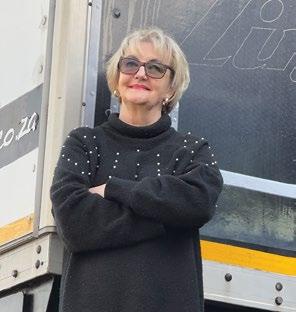


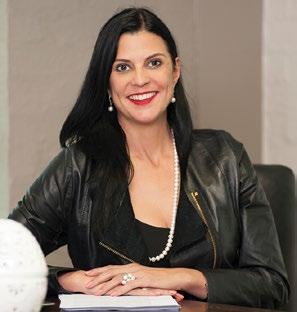

Pulane Shomang Helping to put SA’s film/TV industry on the global map 16 Charmaine Mabuza CEO ITHUBA (RF) (PTY) LTD 20 Verona Oliver Promoting diversity 22 Celéste Burger Strategic marketing enables growth 24 sabusinessintegrator.co.za Michelle Combrinck Unlock leadership potential 26 Sibusiso Raphekwane Breaking barriers 28 Grace Harding Ocean Basket Group – Focus, simplicity and courage 32 women women IN LEADERSHIP IN LEADERSHIP Sarina De Beer An influencial leader in benchmark research, shaping industries 36
Pulane Shomang:
Helping to put SA's film/TV industry on the global map
Pulane Shomang, CEO of South African Woman in Television Arts (SAWITA) highlights how drive and passion unlocks opportunities in the TV and film industry.

Tell us how your journey in film and
It all started when the announcement was made by the then Minister of Communications that SA will be migrating from analogue to digital transmission. At the time I had just joined the National Association of Manufacturers in Electronic Components (NAMEC) in the content division. I knew that once set-top boxes were installed everyone would need content, and that's when I started producing content for different platforms because content is king!
What are the key milestones at SAWITA?
SAWITA started operating as a content aggregator for a UKbased company called Vubiquity (VU), where we aggregate content for VU from SABC, DSTV and eTV. As a content aggregator, you work with both the content owner and the different platform owners, to make sure you give the platform owners the best content that their viewers will enjoy. You get to attend film festivals around the world, where you meet with different content producers, and license their content for the different platforms. As a content aggregator, once you put your name out there and build solid relationships with content buyers as well as content producers,
16 sabusinessintegrator.co.za
Q&A: SAWITA
SAWITA: CEO Pulane Shomang
WOMEN IN LEADERSHIP
they start to trust you, and word of mouth spreads faster than anything. Before you know it, everyone in the industry wants to work with you.
Another highlight is we started working with MTN on their video-on-demand platform FrontRow, then continued to work with the Vodacom platform, Videoplay.
Last but not least, we also worked with Cell C Black. After being a content aggregators for four years, we then signed a co-production deal with VU to produce drama series for local and international markets, and that’s how our first drama series, Family Secrets, came about.
Family Secrets season one debuted on SABC1 in 2020 during the pandemic. It had 3.2 million viewers on its premiere night, and it was one of the most watched shows on SABC1 every Sunday at 8pm. In its sixth week on air Family Secrets was amongst the Top 20 most watched shows on SABC1. SABC went on and licensed Family Secrets season two which performed just as well as season one.
I have recently produced my third drama series, The Executives, which SABC licensed. It is currently airing on the SABC streaming platform, SABC Plus.
How does your involvement in Sisters Working in Film & Television (SWIFT),
and being the President of the SA branch of Inyani tie in with your work at SAWITA?
SWIFT is a non-profit organisation that’s committed to championing empowerment and access to equal opportunities for women in this industry. As a woman-led company, SAWITA saw it befitting to be part of this organisation, because we are both focused on working towards a common goal to empower and promote women in this male dominated industry.
Inyani Corporation is a fairly new global film production company that was established in 2021. Its head office is in Los Angeles, and it has subsidiaries in South Africa, Germany, London,
Miami and Seoul. As one of the directors I was appointed to head the South African office.
As a director of the Inyani Corporation, I’ve always pushed the women agenda, especially in my company, I’ve always given first preference to women when I put together a production crew and cast. I make sure the top positions are occupied by experienced women who will do it for all women and execute their jobs as well as any men in those positions. There are several projects in the pipeline; just watch this space!
What appetite is there for South Africa’s TV & film industry on the global stage?
Drama series like Kings of Joburg, and Blood and Water on Netflix held the number one spot for weeks because of the authentic South African stories. Netflix is showing the world that South African productions are capable of producing world-class entertainment shows, and people are loving it.
How does the TV & film industry help drive growth and enable change?
TV and film has enabled growth and change in so many ways in this industry. For example, brands are using television to spread awareness as they can reach specific segments of the market about their different offerings, and it can drive action with different audiences.
Should business be more involved within the industry?
Business should start getting involved and investing in this industry, especially if your business is about selling or marketing a new product. Product placement on the show is the in thing. As the producer of the show, I am now working with different brands, both old and new, to incorporate their product in the storyline. Brands are guaranteed that viewers will definitely see their brand and they will get their return on investment.
17 sabusinessintegrator.co.za Q&A: SAWITA
What in your opinion are the greatest challenges facing SA's TV & film industry?
The greatest challenge facing the South African TV and film industry is the lack of funding. Most producers have brilliant stories to tell, but to produce those shows costs millions and we don’t have institutions that are willing to fund such productions. That is why most producers don’t own their content but are commissioned by platform owners.
What are some untapped opportunities for the local industry?
As content producers and content creators, we need to start telling our African stories. Viewers want to identify with the characters they are watching. If we don’t tell our stories, international producers will tell our stories. We are slowly but surely getting there, it’s only a matter of time.
SAWITA has partnered with international production companies to produce feature films in both South Africa and in the US.
Tell us a bit about SAWITA's production training and mentorship programmes.
SAWITA’s mentorship and production training programmes help individuals who have qualified at different film and television institutions. They work on different productions that SAWITA is involved in so that they can gain experience in different departments, for example, writing, production, and post production.
These mentorship programmes are mostly for the youth; kids that have just graduated from different institutions and colleges between the ages of 22-35 years. It is a six-month mentorship
programme during which each individual is rotated in different departments so that they have a 360 degree experience of what production entails.
What are some of the future plans you have for SAWITA?
SAWITA has partnered with international production companies to produce feature films in both South Africa and in the US.
What would you credit as the main points for your leadership success?
Good communication is the main ingredient of my leadership success. As the CEO of the company, I have an open door policy with my staff. They can come to me with any issues they are facing, whether it’s a personal issue or a work issue. This creates better relationships with my employees.
What were some of the key learnings you have made throughout your career?
That failure is not the end of everything, but a chance for a new beginning. When you fail the first time, you know that it’s not the end of the world, because when you try again you’ll be doing it from experience.
I would advise aspiring leaders to:
• Always have realistic goals.
• Know your strengths and weaknesses.
• Surround yourself with knowledgeable people.
• Note that you can’t know everything – hire experts that understands your vision, and help you build your company.
What does the future hold for you?
Good question! No-one knows what the future holds, but what I know for sure is that as long as I’m alive, I’m going to make sure that I create a future that’s better than the present, by uplifting the South African television industry through the development of internationally recognised content that’s relatable to both international and local content consumers.
18 sabusinessintegrator.co.za
Q&A: SAWITA
INDISPENSABLE LINK
This is an indispensable link in the value chain of our core mission to invest in the acquisition of quality broadcast content for the full range of platforms available today on our continent.
SAWITA (South African Woman in Television Arts)

SAWITA WAS BORN FROM A VISION TO PRODUCE WORLD-CLASS REALITY-DRIVEN LOCAL TELEVISION PROGRAMMING WITH A PASSIONATE FOCUS ON BUILDING A SUBSTANTIALLY LOYAL FAN BASE AND THE FOUNDATION FOR CONSISTENT ANNUITY INCOME.

KEEN EYE
The explosion of new technologies that are ever present at all our doorsteps, sharpens SAWITA’s sense of purpose each day to grow its business across key markets in Africa by keeping its finger on the consumers’ pulse and a keen eye on the exponential appetite for on-demand media technology which is making its presence felt on the global market place at a blinding pace.
www.sawita.co.za info@sawita.co.za | +27 (0)10 824 5199 37 Homestead Road, Homestead Office Park, Sandton, 2191
SOUTH AFRICAN BUSINESS INTEGRATOR Q&A: CHARMAINE MABUZA, CEO ITHUBA (RF) (PTY) LTD

You are considered a trailblazer in many ways. You were a Director at Whiphold, the first Black female-owned investment company to list on the JSE. You are also the first Black female CEO awarded a license to operate the National Lottery.
Tell us a bit about your journey of being an entrepreneur. Was it always your vision to become and entrepreneur? What inspired you and what keeps you motivated?
I was brought up in a township by my mother, who was incredibly entrepreneurial and a trailblazer in her own right. She has always been my biggest inspiration, making a good living without any support. She is full of grit, and witnessing that first-hand has always motivated me to work for myself and pave my own path. Having achieved success, uplifting others is now my biggest motivation.
Over the years, ITHUBA has seen a plethora of changes, particularly in digitisation. Tell us a bit about the journey of ITHUBA’s evolution under your leadership.
It will be eight years in June 2023 since you took the reins as CEO of ITHUBA. What have been the major milestones?
Our first major milestone was at only two years in, where we spearheaded the move away from the traditional ball machines in 2017 and replaced that with a random number generator and digital draw show. This bold move allowed us to continue game draws during the COVID-19 lockdown period, while some Lotteries worldwide had to stop their draws due to live shows. Another big coup for us was launching the digital platform that has greatly improved the UX and allowed our players to buy tickets through their banking apps.
Under your leadership, ITHUBA attained record-breaking performance figures. What do you attribute this to?
I attribute our success to our initial commitment and mandate to reinvigorate the National Lottery. This mandate allowed us to focus on making big moves that have seen us revitalise the National Lottery and grow it immensely. ITHUBA is officially the largest National Lottery operator in Africa – and has also been recognised as one of the top five lotteries in the world during our tenure, as listed by the World Lotteries Association.
How do you foresee the growth of ITHUBA going forward – what are some of the key projects you intend on implementing?
Our key strength so far has been keeping up to date with new technologies, so many of our projects are based around keeping in check with what’s current and ensuring that our games align with our player’s needs and wants.
ITHUBA also has several CSI initiatives supported by ITHUBA, which is in addition to the funds generated towards good causes through the National Lotteries Commission. There is a lot of growth potential in Africa, and woman’s empowerment is a big driving factor for us now and going forward.
Tell us a bit about your journey of being a female entrepreneur.
What have been some of the main challenges in navigating the business world as a female?
I have had a very supportive team from the beginning, and ITHUBA is not my first attempt at leading a company, so I have some experience to back me up. Female leaders will always be under a more intense level of scrutiny than their male counterparts, so I always make sure my decisions are well-researched so I have complete confidence to make the moves I think are best.
What were some of the key lessons you have learned?
Trust your gut, trust your team and do your research. Intuition is important, but equally, so is data. Don’t allow yourself to make business decisions based on emotion - always let research lead your thinking.
According to reports, you are passionate about mentorship, particularly female empowerment. Tell us a bit about this.
I often speak about my mother as my inspiration, and she has fuelled me to start different initiatives at ITHUBA. We have a female retailer empowerment programme, as well as Scholarship and graduate programmes, which all entail a portion of counselling and mentorship. I believe in the power of strong partnerships, so professional coaching is essential to us at ITHUBA.
You have been the recipient of numerous awards recognising your achievements in the business world as well as from a philanthropy perspective.
What is your definition of success?
Success means different things to different people, but for me, success is empowering those around you. I have empowered many students and entrepreneurs over the years to make lasting changes through education and opportunity. Paying it forward to me is the true mark of success.
What are you most proud of?
I am most proud of ITHUBA for becoming the leading operator in Africa and receiving the Top Empowered Company Award. Those are two achievements that stand out to me.
Considering your background and your success, what advice would you share with aspiring entrepreneurs?
Look for the type of work colleagues you aspire to be like, approach them and ask them to mentor you. If they are incredibly busy, ask for a chance to shadow them. Most leaders are impressed by selfmotivated people.
ITHUBA is well-known for investing heavily in SED and ESD initiatives. What is your personal belief regarding the responsibility of leaders/ businesses to pay it forward?
For South Africa to become a more equal society, we all need to continue to contribute to opportunity. Corporate citizens have a big responsibility, as the disparity and poverty in our community is alarming.
What are the areas in terms of socio-economic development and enterprise and supplier development that you are most passionate about, and why?
I am interested in funding small businesses that serve the communities they are based in. When you uplift small businesses and entrepreneurs, the positive knock-on effect is that the entire community benefits from job creation or better local resources.
Considering the realities facing South Africans, i.e. high unemployment rates, load shedding etc., what is your advice to the private sector on balancing profits with socio-economic investment, skills training and development?
We need to examine our CSI portfolio and ensure that we are actually delivering help that’s necessary and valuable in the long term. For example, a food drop can help a community in the short-term, but clean water resources will serve them better in the long run, or the ability to nurture their own vegetable gardens and feed themselves. I think there needs to be a level of empowerment that we extend with CSI efforts. Not simply a hand-out but rather a hands-up.
Tell us about your thoughts on leadership.
Leadership is often celebrated, but it’s also much responsibility. What constitutes a leader, and what three key traits do you believe are required to be an efficient/successful leader?
The 3 key characteristics are humility, self-awareness and determination.
In an ever-changing landscape, how do you, as a leader, ensure that you keep your business at the forefront of change?
It would be best if you had a dedicated team whose goal is to keep tabs on market movements, technology and innovation. You must continually see how you can evolve to work the most from your team.
Charmaine Mabuza is the CEO of ITHUBA and former co-founder of Zamani Holdings. With Mabuza at the helm, ITHUBA has reached great success over the past eight years of operations, and she is widely celebrated not just for her business acumen but for her philanthropic ventures and work in female empowerment.
ITHUBA was awarded their operating license in June 2015, and as the third operator in South Africa, they have successfully revived the National Lottery’s operations in less than a decade. They are recognised as the leading Operator in Africa and one of the top five lotteries worldwide.

Promoting
With employees spread across all four corners of the globe, diversity is at the heart of Accor’s DNA.
By Verona Oliver, Accor: Director, Talent & Culture Sub-Saharan Africa

At Accor we foster an open and inclusive culture that welcomes all personalities, empowers team members and cultivates individual and collective innovation and performance.
Fostering a culture of diversity, equity and inclusion is one of our main priorities. Our strategy is focused around four main key areas: Gender diversity and equality; Inclusion of people with disabilities; Richness of social, ethnic, racial and cultural diversity; and LGBTQI+ inclusion.
We strive to turn our vision into reality through global and local actions that have significant impact and are helping to drive progress. Various projects, led by our international diversity, equity and inclusion community, bring our commitments to life around the world and at all levels of our Group.
Initiatives to support team members
We have been implementing various initiatives to ensure we are supporting team members throughout their career at Accor and guests from the community effectively so they too feel that they can work, travel and discover the world safely by boosting visibility, recognition and integration of the LGBTQI+ (lesbian, gay, bisexual, transgender, questioning, intersex and "+" for other gender identities and sexual orientations not specifically covered by the other initials) community within the Group.
We play a pioneering role in countries such
Verona Oliver
as South America, starting in Brazil, where we have been voted two years in a row one of the best companies to work for, by joining the Fórum de Empresas e Direitos LGBTI+ in 2017, an organisation aimed at encouraging companies to promote LGBTQI+ rights, spreading this across Argentina, Colombia, Chile and Peru.
In North America, we launched the "Love Limitless" package for Pride Month and in Spain, UK and Australia, our teams participate in Pride events throughout the country.
Another example of how our commitment translates into real action is the introduction of full parental leave benefits for all couples irrespective of gender, in both our Bangkok office since 2019 and in our Paris headquarters since 2022. Also at our Paris headquarters, team members have launched of the #TOGETHER! community, the Group's first LGBTQI+ employee resource group.
These global initiatives have challenged us in SA to rise and join the movement wholeheartedly. Training is essential to change the way people look at the LGBTQI+ community, to raise awareness of stereotypes, prejudices and decisionmaking biases, and thus to facilitate recruitment, integration and professional development – this is where we start to influence change!
We endeavour to remove obstacles so that there is less stigma attached to people declaring themselves as part of this network.
22 sabusinessintegrator.co.za DEI
diversity
WOMEN IN LEADERSHIP



Strategic marketing
enables growth
Celéste Burger assists companies implement brand, creative and marketing strategy with measurable return on marketing investment.

What inspired you to become an entrepreneur?
I realised that the status quo didn’t cater for my character traits, and felt unfulfilled in traditional work environments. I thrive on bringing creative ideas to life, viewing challenges differently, innovating to meet market demands, the freedom to make my own decisions, set my own goals and reap the rewards. I noticed the disconnect between disparate marketing tactics, creative effort, and unmeasured results.
Becoming a Chartered Marketer was a transformative journey. I started an integrated marketing offering focussed on ROMI. With a disposition to continuous learning, marketing is a vast field to deepen one’s knowledge.
Highlight your service offerings, and how your experience unlocks opportunities.
cementing marketing merit. Cross-industry project implementation drives results for my clients.
What have been some key milestones in your career, and what do you contribute these successes to?
Being invited to the “MPP Design for Change” collective project in South Africa. A first of its kind, it donated all proceeds to the Nelson Mandela Children’s Hospital. My work was included in this international travelling exhibition, from New York to Bosnia. This project was not for personal gain and beat any award I won for design, hands down.
I was honoured to be elected President of the Audit Bureau of Circulation (ABC) and serve on the Board of the Marketing Association of South Africa (MASA). Both non-profit organisations enable me to contribute to the industry.
Setting up a creative collaboration hub had long been my dream. This space enables cooperation for creatives and artists, unlocking opportunities. I am inspired by marketing for social change.
Perseverance is the main contributor to my career; seeing setbacks as learning opportunities is challenging but worthwhile.
I provide an outsourced Chief Brand and/or Marketing Officer role to mid-sized companies –my work helps in aligning their business strategy with brand and marketing strategies. I contribute marketing knowledge critical for developing, executing, and integrating marketing efforts across silos and channels, unlocking new opportunities and optimising resources. I own a full-solution brand communications agency, supporting clients with cross-platform tactic implementation. Additionally, I assist in directing brand and meaning, creating a constructive environment
STRATEGIST, CHARTERED MARKETER, ENTREPRENEUR & CREATIVE
BRAND
Burger
Q&A: CELÉSTE BURGER
Celéste
24 sabusinessintegrator.co.za WOMEN IN LEADERSHIP
How do you stay ahead of marketing trends?
Shared interest groups and networks! Extensive reading, research, case studies and industry leaders keep me updated with technological advancement and customer behaviour. The most exciting opportunities often derive from the cross-pollination of diverse industries. These learnings assist in contextualising impacts on businesses. I explore thought leadership and social philosophers whose central focus is civilisation design and developing new capacities for sense- and choice-making.
What are your thoughts on marketing budgets being cut in times of crisis?
Research consistently demonstrates the positive impact of sustained marketing efforts during economic turbulence for businesses to position themselves for long-term success.
Maintaining or increasing marketing budgets during an economic downturn protects market share. It strengthens brand equity and captures opportunities and customer loyalty. Your message also has a better chance to be heard when everyone else markets less.
How does marketing and branding assist organisations in maintaining their value positioning?
These assist organisations in maintaining their value positioning by differentiating them from competitors, shaping customer perception and brand reputation, effectively communicating value, cultivating customer loyalty, and enabling adaption and innovation.
Brand equity is increased through brand awareness, associations, perceived quality, customer loyalty, proprietary assets and other positive attributes associated with your brand.
How does an outsource CMO or CBO enable growth?
• Identifying emerging market trends, consumer insights, and untapped customer segments. This information is leveraged to develop creative
marketing strategies and initiatives that align with the organisation’s objectives and goals.
• Collaborating with cross-functional teams to drive product development, enhance customer experiences, and create compelling messaging that resonates with target audiences.
• Unlocking marketing channels, technologies, and partnerships to expand the organisation’s reach, competitiveness and influence.
• Tracking KPI’s, measuring effectiveness, and adapting strategies to optimise outcomes.
How do you foresee the evolution of marketing, and how should businesses adapt?
Personalisation. Preventative care. Social interventions. Mind-blowing experiences. AI-powered analytics and machine learning algorithms enable marketers to analyse vast amounts of data quickly and accurately, gaining valuable insights into customer behaviour, preferences, and trends.
You can’t own the headspace of your audience if you don’t understand them.
Forrester noted that insights-driven businesses with advanced capabilities are 8.5 times more likely than their beginner counterparts to report annual revenue growth of 20% or more. We are moving from reactive to predictive decision-making.
AI facilitates predictive modelling, enabling marketers to anticipate customer needs and allows for proactively personalising customer experiences and enhancing marketing effectiveness.
Through big data, AI can analyse millions of online conversations, images, and other assets from thousands of sources and combine that with shopping or engagement behaviours. This allows for the identification of untapped trends and product or service innovation ideas.
The future of marketing is knowing your customer so well that you know what they will need before they do; the challenge is, doing it authentically and ethically. Contact@on-demand-cmo.com | 082 461 3748
Q&A: CELÉSTE BURGER
25 sabusinessintegrator.co.za
Unlock leadership potential
By Michelle Combrinck, Co-founder of The Zinto Marketing Group

Only you can decide to be the best leader in your environment
We are all different and come from different backgrounds, religious and cultural groups, educational environments, and more, but only you can decide that you want to be the best leader in your particular environment, be it in the corporate space, the entrepreneurial space, the home and parental space, government space – wherever you find yourself. Our schooling system perpetuates the misguided thinking of selecting prefects and head girls and boys/class captains etc., citing “leadership qualities” which automatically makes other learners believe that they are not leaders because they were not selected. Anyone can “choose” to become a leader in her own right because she makes this decision and does not wait to have the title bestowed upon her by someone else.
Leadership with kindness
As a female leader, I was always fascinated by the differing leadership styles in my various places of work.
I decided to adopt my own style when I was teaching, and when I started my own business –leadership with kindness. I became very excited years later when Jacinda Ardern, Prime Minister of New Zealand, practised the “politics of kindness” which made her very much loved and respected.
Women are formidable agents of change

It is time for the world to recognise the benefits of women in leadership and commit to placing even more women in positions of leadership.
Women are formidable agents of change, and the far-reaching benefits of diversity and gender parity in leadership and decision-making are increasingly recognised in all spheres. Still, women continue to be vastly under-represented in decision-making in politics, businesses and communities.
I believe in leading from the inside out; valuing excellence, paying attention to detail, going the extra mile, valuing my colleagues and surrounding myself with people who are better skilled than I am (they are not a threat), showing genuine respect for others and practise ubuntu in the workplace (and outside).
Practise intrinsic motivation
Simply because we are all different and by sharing knowledge with younger colleagues, mentoring them and showing an interest in their dreams and visions for their futures, they pass on their knowledge. In so doing, you are gaining their respect and collaboration in order to work together towards the goals of the business and their own personal goals.
As a woman leader, I keep reading to practise intrinsic motivation so that I can continue to motivate my colleagues around me so that they can “pass it on” to their younger team members. I believe that this leadership style has helped me to grow and add value to the business, our clients and our colleagues.
Women continue to face myriad challenges in the world of work, and we can combat them by discussing them openly in the workplace (this is not always easy) but we will not give up and accept the status quo. Hence the need for women to help one another and support one another and not belittle or bully one another just to gain the upper hand. This is wrong.
Aluta
continua!
26 sabusinessintegrator.co.za
PROFILE: ZINTO
This is my story of leadership and mentorship and what it has taught me over 40 years of teaching and becoming an entrepreneur.
WOMEN IN LEADERSHIP

Meet at in Cape Town. The land of sea, beaches, mountains and vineyards. Let our experienced team help you create an exceptional event at the Cape Town International Convention Centre (CTICC). Enjoy our flexibility and world-class services, not to mention the exquisite beauty of our mother city, ranked amongst the most beautiful in the world. ADD A DIGITAL ELEMENT WITH OUR HYBRID SOLUTION, CTICC +27 (0) 21 410 5000 sales@cticc.co.za www.cticc.co.za the CTICC
Breaking
In the realm of entrepreneurship, women have often faced challenges and barriers that hinder their progress and growth. However, Sibusiso Raphekwane, Founder and CEO of The Transformation Legacy, is determined to change this narrative. With her expertise in entrepreneur development, she is on a mission to empower women and build thriving, legacy-driven businesses in Africa.
With 15 years of experience in business and 12 years in enterprise development, Raphekwane brings a wealth of knowledge and mentorship to the table. Her unique approach to business mentorship goes beyond the transfer of skills; she integrates personal mastery into her programmes. As an ontological coach, Raphekwane believes that self-awareness is a crucial component of achieving success and longevity in business.
Her mentorship programmes focus on imparting business skills and building the personal value of the individuals behind the businesses. By helping entrepreneurs navigate their strengths, talents, and capabilities, she ensures that their businesses yield adequate performance.
Unconventional yet effective approaches
Through her unconventional yet, effective approach to business, Raphekwane and The Transformation Legacy have successfully supported and developed a total of 405 entrepreneurs since inception, with 70% being femaleled businesses. As a result of her efforts, over 80% of the businesses supported have grown and remain sustainable.
Corporate giants such as Momentum Metropolitan Holdings, Coface, and South African National Parks have acknowledged the impact of The Transformation Legacy’s tailor-made Enterprise and Supplier Development and mentorship programmes, praising her and her team for responding to their specific business needs.

Passionate about the development of a township economy, Raphekwane and her team – which is 100% black and female, launched the Township Entrepreneurship Summit for early-stage female entrepreneurs in Hammanskraal. The initiative zoned in on building the confidence levels of female entrepreneurs to help propel

them towards a fruitful entrepreneurship journey. The platform also enabled entrepreneurs to form relationships with fellow entrepreneurs, build a supportive network and learn the basic principles of building a successful business, among other things.
Significant contribution to the SA small business community recognised
Raphekwane’s significant contribution to the South African small business community were recognised by SANTAM in the Women of the Future Awards, True Love Prestige List 2022, where she was among one of the 36 women honoured for exemplary leadership, integrity, dedication and passion. Additionally, the exceptional work of The Transformation Legacy team was recognised at the Standard Bank Top Women Awards under the “top empowered” category.
As part of pioneering the enterprise development and business mentorship agenda in Africa, Raphekwane is currently working on publishing a book that will cover topics on entrepreneurship and leadership. She also has her sights set on using her gained experience and theoretical knowledge to launch a Transformation Legacy Academy for youth and establish a foundation for young boys and girls that will build a culture of entrepreneurship and self-sustainability.
28 sabusinessintegrator.co.za PROFILE: THE TRANSFORMATION LEGACY
T: +27 (0)10 023 0508 | E: info@transformationlegacy.com | W: www.transformationlegacy.com LinkedIn: The Transformation Legacy | Facebook: TheTLegacy | Instagram: thetlegacy | YouTube: The Transformation Legacy
barriers
WOMEN IN LEADERSHIP
#ImpactStories:
Are you ready to make a lasting impact on South Africa’s entrepreneurial culture? Work with us and harness the potential of your Enterprise Supplier Development (ESD) programme.

Forge Partnerships. Empower Local Businesses. Work With Us!
Through a uniquely designed ESD programme, tailored to meet your organisation’s needs, you can transform your business outputs by contributing to the growth of small businesses, positively impacting the economy and developing a reliable potential supplier database that is:
a efficient
a delivers quality work and;
a innovatively responds to your corporate needs.
“The Transformation Legacy takes the time to implement programmes which have a lasting impact and as an organisation, we benefit immensely from their services because it is our responsibility to contribute towards the operational and financial sustainability of black owned small businesses,”
- Momentum Metropolitan Group Lead: Enterprise and Supplier Development, Fiona Ally.
Be a catalyst, empower entrepreneurs, leave a legacy!
If you want to work with us too, contact us today.

Email: info@transformationlegacy.com
Contact Number: +27 10 023 0508
Address: Constantia Square Office Park, 16th Road, Randjespark, Midrand, 1682
Website: www.transformationlegacy.com


Simply Seafood. Since ‘95 oceanbasket.com
Ocean Basket Group –
Focus, simplicity and courage
From one restaurant in Pretoria in 1995 to over 200 Ocean Basket restaurants in 16 countries across the globe, Ocean Basket delivers the very best seafood dining experience to over 18 million people every year. From Kazakhstan to Cyprus, Mauritius to Ghana, individuals unite in their appreciation of Ocean Basket’s award-winning seafood and commitment to value. We spoke to Grace Harding who has been the CEO of Ocean Basket for over 11 years.
Tell us a bit about the growth of the Ocean Basket Group. How have you grown a local business into a global brand?
Ocean Basket goes beyond the individual; it is about the team and a brand that has gained immense recognition, love, and trust. When I joined the Ocean Basket Group, we only had a few restaurants operating in other countries. Our growth can be attributed to the widespread recognition our brand has achieved.

One significant milestone in our expansion was when we launched in the Dubai International Airport. This breakthrough opened numerous opportunities for us, just as our restaurant in Cape Town’s V&A Waterfront paved the way for our entry into Dubai.
Cyprus has also played crucial role as a powerful advertising platform, attracting businesspeople who have experienced the quality of Ocean Basket. As a result, we have expanded into countries like Kazakhstan and Malta.
What are some of the key milestones, and how have these unlocked transformation within the Group?
The restaurant industry has created opportunities for many. With its low barriers to entry, our restaurants are predominantly operated by individuals who have grown and risen through the ranks. Many of them have gone on to become part of our franchise system. This growth and progression is also evident in our support team.
OCEAN BASKET GROUP
CEO
Q&A: OCEAN BASKET GROUP
Grace Harding
32 sabusinessintegrator.co.za WOMEN IN LEADERSHIP
SA has experienced a variety of challenges over the past few years including a pandemic and ongoing loadshedding. How has the Ocean Basket Group navigated this?
Tough times always bring about new thinking and a drive to find new solutions. The Ocean Basket Group has expanded its sourcing network from under five countries to over 15 in just eight months. Our supply chain strategy includes strategic partnerships and innovative container-filling methods. Economies of scale and considering benefit for everyone in the value chain is important. The world is shifting towards partnerships for broader benefit rather than just focusing on individual interests.
economies of scale even harder. We prioritise responsiveness to our partners' needs and hold their investment decisions in high regard.
What advice would you give to entrepreneurs wanting franchise opportunities?
Franchising covers many business categories. While I can only speak about the restaurant sector, I would advise entrepreneurs to scrutinise many options before deciding. It's not only about opting for a well-known brand; success hinges on robust systems, processes, and supportive infrastructure.
If you don’t get that, then you might as well open up your own business. Taking ownership of your investment is essential. Remember, franchising is a partnership, not a fail-safe way of living. Nothing replaces hard work and grit.
a reliable business model and a reputable brand.
What is the foundation of the Ocean Basket Group’s success?
Focus, simplicity and courage. To stay focused on only seafood is a long game. Seafood is not the number one protein of choice, and we have never been tempted to add burgers or chicken meals. We are devoted to seafood and see the potential it has. Delivering a seafood dining experience at a great price is the cherry on the top. We have spent nearly 30 years navigating this strategy, and it continues to evolve.
From a franchise perspective, there are still people who want to invest in a reliable business model and a reputable brand. We have not seen a decline in interest. However, investors now scrutinise ROI more closely, prompting us to drive
You have said, “I think the thing that works during times of struggle is unity”. What does this mean to you?
Covid brought the sit-down restaurant industry together, fostering a sense of unity. It never used to be an industry where competitors united to create something meaningful for the industry as a whole. However, we realised that standing alone reduced our voices to a whisper. To be heard, we took responsibility by gathering data, seeking representation, and expressing our desire to make a positive impact on our country. After all, without data and representation, we cannot expect the government to sit up and take notice. We would love government to also invite the smaller industries to the boardroom table for inclusive decisionmaking.
Is there sufficient support for the restaurant sector from government and industry to help promote growth, unlock employment opportunities and skills?
The government has made significant efforts in
Q&A: OCEAN BASKET GROUP
33 sabusinessintegrator.co.za
From a franchise perspective, there are still people who want to invest in
driving skills development through SETAs. When it comes to the restaurant industry and its vast value chain, there is huge opportunity for more. More awareness, more deliberate skills development plans, and promoting the restaurant and hospitality sector as a great place to work.
We want to drive this together with the government. By pooling resources, including major restaurant groups and renowned chefs like Shaun Smith, we can drive positive change together. It’s all about collaborating. Government cannot make magic alone, and neither can we.
What has been the biggest change to impact the industry, and how has the Ocean Basket Group navigated this?

Ocean Basket is a strong brand, held together by authenticity, care and love. As a privately owned business, the core values of our brand have remained strong. We never want to compromise on quality or experience. If there is ever a batch of seafood that falls short, it truly devastates us.
As for our current challenges, we recognise that we must navigate around them as we are unable to solve their core issues. For instance, our chips may not always have the desired extra crispy coating due to manufacturers' limited electricity supply.
We also encounter additional expenses, such as the extra R30 000-R40 000 a month for diesel as well as the additional cost of power walls, generators, rentals, and concerns for the wellbeing of our non-South African staff members.
Over the past 20 years, the restaurant’s net profits have been eroded. Passing increases on to the customer is not sustainable. Everyone is under pressure. That means it’s a fine line and a tight squeeze. It requires constant reinvention to cope with the circumstances.
We strongly urge the government to include us in their strategies and think tank sessions that directly impact our industry. We are dedicated to South Africa and the over one million staff the restaurant and hospitality industry employ, and the thousands of business owners who have millions invested in their restaurants.
Tell us a bit about the Group’s sustainability journey.
Sustainability encompasses everything from responsible fishing, recycling and the well-being of people – all people. This includes our staff, as well as the staff of our suppliers and partners.
We prioritise meticulous care in fishing practices and proudly display our SASSI seal of approval. Taking a holistic approach, we consider our supply chain and its sustainability.
Our logistics partners, Digistics, have great projects underway that aim to save fuel and electricity. The need to reinvent our electricity sources has been imposed upon us, and we actively seek alternative solutions.
34 sabusinessintegrator.co.za Q&A: OCEAN BASKET GROUP
How do you foresee the industry unfolding over the next couple of years?
I wish I had a crystal ball. People want to connect, eat together and have some reprieve from the drudge of life. People all over the world feel depleted. Food has brought people together around a table since biblical times. We get together to share a meal to celebrate, cry and take a breath.
What are the key opportunities in SA’s hospitality industry?
There are always opportunities. They arise from great co-creation between suppliers and clients, as well as collaboration among competitors. I believe that we have already become less territorial and are sharing our problems.
Increased collaboration and navigating the obstacles will give birth to new ideas. Embracing virtual specialists offers exciting possibilities. Who needs a business analyst in the office these days? They can be based anywhere in the world. This will give us a wider perspective and a global scope.
What are the challenges facing SA’s hospitality industry?
The current brain drain from South Africa is concerning. The state of electricity and the overall decline of our country are disheartening. Our country is rich and yet so poor.
Tourism needs to improve. We need to market our country properly. We need to invest in brains and great marketing tactics. The rampant theft must stop. I drive through small towns that are completely broken. People are losing hope. We need strong leadership. The leaders of our country should have KPIs and be held accountable. One should run the country in the same way one runs a business.
What can we expect next from the Ocean Basket Group?
We are determined to grow. In 2022 and 2023, our focus has been on regrouping after opening two
restaurants in the UK during a period of economic crisis. We are learning, our restaurants in the UK are finding their feet and the Brits are slowly discovering affordable, delicious seafood.
We have also been addressing the challenges within South Africa, striving to find stability amidst the chaos. Looking ahead, we have plans to open four new restaurants in Africa this year through licence partners.
What has been the key to your success as a leader?
Success is not a destination. It does not just arrive. It comes and goes. Success and failures dance together in my life all the time. I am grateful to all my mentors over the years, to the founder of Ocean Basket, Fats Lazarides, who gave me such a great opportunity and taught me about this industry. I remain curious and ‘ignorant’. And, have nerves (and balls) of steel. I am driven by my deep care for others. And for making things better wherever I can.
What are the lessons you have learned?
Be nice to everyone. Always. There is no reason to be rude or demeaning. Always tackle the bad things – poor performance, problems, culture misalignment. Never stop learning. Always say thank you.
About Grace Harding
Grace Harding, CEO of the Ocean Basket Group, has spearheaded its transformation with a steadfast commitment to industry unification and enhancing guest experiences. Her leadership, rooted in simplicity, focus, and purpose, draws from a passion for theatre and travel. Prior to her role at Ocean Basket, Harding made a significant impact as a leadership specialist, using her 15-year tenure at Edgars Group and her leadership consultancy to galvanise leading South African brands. As cofounder of The Restaurant Collective, she's shown a dedication to industry progress.
35 sabusinessintegrator.co.za Q&A: OCEAN BASKET GROUP

UNLOCK YOUR COMPANY’S POTENTIAL
with Learnerships and Bursaries at Red & Yellow
Are you partnering with the right institution to reach your goals and effect change?
Red & Yellow’s expertise in education and industry partnerships empowers you to create real impact for your business and for the future of South Africa’s workforce.
Red & Yellow Learnerships and Bursaries will help you achieve:

• Training for talented students who are passionate about the creative and business fields
• Meaning impact on the youth’s career goals
• Enhanced brand visibility as a socially responsible organisation
• Collaboration with an industry leading institution for B-BBEE points
• Contribution to diversity and transformation
Email: corporatetraining@redandyellow.co.za
Call: 087 227 3283
Visit: www.redandyellow.co.za

WhatsApp: 010 288 0682
Red & Yellow is the perfect higher educational provider to partner with for a Learnership. The guidance and support from senior leaders to operational implementation has made coordinating two learnerships a breeze for Ogilvy SA. Thanks for the phenomenal support to both Ogilvy SA and our learners in making this happen!
– Liesl Damain-Harris, Ogilvy SA, Head of Learnng and Development
Get in touch today Scan to chat
Alarming trends
in the SME road freight sector
An online survey conducted by JC Auditors (JCA) highlighted a concerning lack of safety systems within the road freight sector of small and medium-sized enterprises (SMMEs).

ROAD FREIGHT
38 sabusinessintegrator.co.za
The survey, conducted with the objective of evaluating safety practices and measures in the industry, uncovered a disheartening scenario that necessitates collective action to significantly improve South Africa's lamentable road safety record.
According to Oliver Naidoo, Managing Director of JCA, key findings from the survey indicate a widespread absence of robust safety protocols that in turn jeopardise the well-being of both heavy vehicle drivers and public road users.
“It also has a significant economic impact –considering that the last Road Traffic Management Corporation report indicated the cost of crashes to be R142 billion or 3,4% of GDP,” he says.
Alarming trends revealed
The survey conducted with SME road freight companies from across the country revealed the following alarming trends:
Poor compliance with regulations: The survey findings revealed a concerning lack of compliance with the relevant requirements of the National Road Traffic Act and other industry standards, with 64% of participating companies lacking proper compliance measures.
Insufficient vehicle maintenance: A striking 68% of SMME road freight companies were found to have inadequate vehicle maintenance programmes. Neglecting proper maintenance increases the risk of mechanical failures, leading to accidents and disruptions in supply chains.
Safe loading: The survey's most alarming discovery was that 87% of companies did not actively monitor their compliance with the legal mass limits outlined in the Road Traffic Act.
Inadequate safety training: An astonishing 72% of respondents reported insufficient driver training. This lack of training heightens the risk of accidents and undermines the overall safety culture on our roads. While formal driver training is crucial, it is just one element in fostering the necessary safe driving culture. Driver monitoring, coaching, and visible
management commitment are also vital.
Driver medical fitness: Shockingly, 78% of companies indicated that drivers were not assessed for medical fitness on an annual basis, and an overwhelming 92% of companies were unaware of whether any of their drivers had chronic illnesses.
Naidoo expresses grave concern regarding these findings, highlighting the urgency for collaboration among industry stakeholders, regulatory bodies, and government authorities to address the identified deficiencies within the SME road freight sector.
However, amidst the challenges, there remains an opportunity presented by the survey findings.
Recommended measures to ensure safety
“It provides us with a chance to enhance the safety culture within SMEs and implement robust systems that foster a safe operating environment,” explains Naidoo, who recommends the following measures: Develop a robust safety policy: Create a clear and comprehensive safety policy that demonstrates the company's unwavering commitment to safety and establishes firm expectations for all employees. The policy should encompass vital aspects, including driver behaviour, meticulous vehicle maintenance, proper load securing techniques, and adherence to relevant safety regulations and standards.
Conduct comprehensive risk assessments: Regularly conduct thorough risk assessments to systematically identify potential hazards and evaluate the associated risks across all aspects of the company's operations. These assessments should encompass a comprehensive analysis of various factors, including but not limited to routes, loading and unloading procedures, driver fatigue management, and any other elements that could potentially impact safety.
Enhance driver selection and training: To achieve this, it is recommended to implement
ROAD FREIGHT
39 sabusinessintegrator.co.za
a robust driver selection process. This process should involve conducting thorough background checks to assess the character and reliability of potential drivers.
Additionally, verifying driver's licences and thoroughly reviewing driving records can help identify any past violations or accidents, enabling better decision-making in driver selection. Comprehensive training programmes should be designed to equip drivers with the necessary skills and knowledge to navigate various driving situations safely.
These programmes should cover a range of important topics, including defensive driving techniques, emergency response procedures, and strict adherence to safety regulations. Ongoing training and refresher courses should be conducted to reinforce safe driving practices.
Implement driver monitoring systems: Installing driver monitoring systems that track key driving behaviours such as speed, acceleration, braking, and adherence to traffic rules will allow for proactive identification of risky driving patterns and enable timely intervention through coaching or additional training.
Ensure vehicle maintenance: Establish a robust vehicle maintenance programme that incorporates regular inspections, servicing, and repairs. Conduct pre-trip and post-trip vehicle checks to identify any mechanical issues that may jeopardise safety. Develop protocols for promptly addressing maintenance needs and maintaining accurate maintenance records.
Promote a safety culture: Foster a safetyconscious culture within the company, by encouraging open communication, actively promoting the reporting of safety concerns, and recognising and rewarding safe behaviour. Empower employees to actively participate in safety initiatives through safety committees, regular safety meetings, and suggestion programmes.
Provide personal protective equipment (PPE): Ensure that drivers and employees are equipped with suitable personal protective equipment, including high-visibility vests, safety footwear, and reflective clothing. Emphasise the significance of wearing PPE in hazardous areas, during loading and unloading operations, and in challenging weather conditions.
Encourage incident reporting and investigation: Establish a robust system for reporting and investigating safety incidents, near misses, and accidents. Create an environment where employees feel comfortable reporting incidents promptly, without the fear of reprisal. Conduct thorough investigations to identify the root causes of incidents and implement corrective actions to prevent their recurrence.
Engage in continuous improvement: Continuously review and analyse safety performance data to identify trends, areas for improvement, and emerging risks. Utilise this valuable information to develop targeted safety initiatives, adapt training programmes, and implement corrective actions effectively. Actively seek feedback from employees and stakeholders to gather valuable insights and ideas for enhancing safety measures.
Stay up to date with regulations: Stay informed about applicable safety regulations and industry standards. Maintain compliance with local, regional, and national laws governing road freight operations. Regularly review and update safety policies and procedures to align with evolving regulations and best practices.
According to Naidoo, the implementation of these steps can lead to substantial improvements in safety performance, risk mitigation, and the well-being of employees and the public for a SME road freight company. “The Road Transport Management System (RTMS) serves as an excellent tool to facilitate the implementation of these measures, promoting both transport safety and business sustainability,” concludes Naidoo.
40 sabusinessintegrator.co.za
ROAD FREIGHT
Unitrans demonstrates commitment to continent with a growing footprint and suite of services
Leading supply chain and operational services group Unitrans is continuing its expansion across the African continent, with a strategic intent to grow its operations and services.



Since its inception six decades ago, Unitrans has established a meaningful and far-reaching presence in sub-Saharan countries spanning South Africa, Namibia, Botswana, Lesotho, Eswatini, Mozambique, Zambia, Malawi, Tanzania, Mauritius, and Madagascar.
With a reputation for reliability, efficiency, and excellence, Unitrans is committed to delivering high-quality services, adapted to meet the diverse needs of its clients. The company's CEO, Terry Bantock, attributes its success to a focus on customer-centricity and a commitment to its employees' development and safety. "Our ongoing commitment to delivering high-quality services has resulted in an increasing demand for our services, leading to a continuous growth in operations," says Bantock.
With a team of highly skilled professionals and a deep understanding of its targeted sectors and local markets, Unitrans is well positioned to capitalise on the growing demand for logistics and supply chain solutions across the continent.
"Africa is a land of great commercial opportunities for those with a bold vision, a willingness to invest, and a relentless drive to find the right way. With an increasing number of people and abundant resources that have yet to be fully utilised, Africa presents a unique opportunity for businesses looking to expand their operations and tap into new markets," continues Bantock.
"At Unitrans, we believe in the power of doing," he says. "This has seen us deliver innovative and sustainable logistics and supply chain solutions on the continent, positively impacting the region's economic and social development".

Commitment to driving innovation and excellence
According to Bantock, the company is involved in several sectors, delivering specialised solutions to industries such as mining, agriculture, petrochemicals, food and consumer goods, industrial goods and people transportation.

"At Unitrans, we pride ourselves on taking a strong partnership approach to deliver customised, end-to-end logistics solutions to our customersregardless of their industry. With many years of hands-on experience and expertise, we offer market-leading specialised fleets and cutting-edge technologies and management solutions."
He says the commitment to driving innovation and excellence, delivering tailored solutions to meet customers' unique needs, remains the company's driving force. However, the company's success is only partially attributed to customer commitment.
According to Bantock, Unitrans also places a high priority on its employees, ensuring that they are valued and understood as individuals. The company was certified as a "Top Employer" in South Africa by the Top Employers Institute (TEI) in January this year, a testament to its commitment to its employees.
Bantock credits the hard work and dedication of the company's employees for its ongoing growth, as they often go above and beyond their duties to ensure customer satisfaction.
He says another priority at Unitrans is that of a safe operating environment. To this end, the company employs the most advanced safety technology and maintains the highest safety standards to reduce incidents and accidents. As a registered training provider with the South African Qualifications Authority (SAQA), the company ensures its drivers undergo rigorous training through its learning and development programmes. This commitment to training and development optimises successful service delivery and road safety.
"Ultimately, it is about driving efficiencies, reducing costs and increasing productivity for our clients. With a focus on collaboration and customercentricity, we aim to be a true partner in our customers' success, delivering value beyond logistics services," concludes Bantock.
ADVERTORIAL: UNITRANS
TRA N SF O R M YOU R W O RL D
REVOLUTIONARY SPORTS STYLING


EXCEPTIONAL PERFORMANCE
SMART TECHNOLOGY

STYLISH + SPORTY
STRONG + ECONOMICAL
THOUGHTFUL + HIGH-TECH
UNCOMPROMISING SAFETY
HUMAN-CENTRED COMFORT
REASSURING + RELIABLE






























SPACIOUS + ENVIRONMENTALLY FRIENDLY

BO OK A TEST DRIV E T O D AY








PROUDLY SPONSORED BY beijingcars.co.za
Shipping losses hit
a record low in 2022
Shipping transports around 90% of world trade onboard different vessels so maritime safety is critical.
 By Allianz
By Allianz
• Safety & Shipping Review 2023: 38 large ships were lost worldwide last year – down by more than a third and the lowest total in the report’s history. South China Sea region sees the most total losses. The British Isles sees the most shipping incidents.
• Fire is the second top cause of loss over the past year with eight vessels lost and more than 200 incidents reported – the highest for a decade. Transport of electric vehicles and battery-powered goods brings new fire risks. Larger vessels and misdeclaration of cargo amplify consequences.
• Oil-related sanctions: growth of shadow tanker fleet posing safety and environmental concerns.
• Globally, maritime piracy is at its lowest level for almost three decades. The overall reduction in activity in the Gulf of Guinea – down from 35 incidents in 2021 to 19 in 2022 – is a significant contributor.
• More expensive claims due to inflation. Cost pressures could impact the shipping sector’s decarbonisation and safety initiatives.
SHIPPING
44 sabusinessintegrator.co.za
Improvements have been significant over the past decade, culminating in the sector reporting a record low number of large ships lost over the past year. However, a combination of factors impacting fire risk, ongoing and new threats posed by the ripple effects of the Ukraine conflict, decarbonisation challenges, economic uncertainty, as well as the rising cost of marine claims, means the sector still has plenty of obstacles to navigate over the next 12 months and beyond, according to insurer Allianz Global Corporate & Specialty SE’s (AGCS) Safety & Shipping Review 2023.
“Shipping losses have sunk to the lowest number we have seen in the 12-year history of our annual study reflecting the positive impact safety programmes, training, changes in ship design and regulation have had over time,” says Captain Rahul Khanna, Global Head of Marine Risk Consulting at AGCS.
“While these results are gratifying, several clouds appear on the horizon. More than a year after Russia’s invasion of Ukraine, the growth of the shadow oil tanker fleet is the latest consequence to challenge shipowners, their crew, and insurers. Fire safety and the problem of misdeclaration of hazardous cargo must be fixed if the industry is to benefit from the efficiency of ever-larger vessels.
“Inflation is pushing up the cost of hull, machinery, and cargo claims. Meanwhile, although the industry’s decarbonisation efforts are progressing, this remains by far the sector’s biggest challenge. Economic pressures could put vital investments in companies’ strategies, as well as in other safety initiatives, in jeopardy.”
Every year AGCS analyses reported shipping losses and casualties (incidents) involving ships over 100 gross tons. During 2022, 38 total losses of vessels were reported globally, compared with 59 a year earlier. This represents a 65% decline in annual losses over 10 years (109 in 2013). Thirty years ago, the global fleet was losing 200+ vessels a year.
According to the report, there have been
more than 800 total losses over the past decade (807). South China, Indochina, Indonesia, and the Philippines maritime region are the global loss hotspots, both over the past year and decade (204 total losses). They accounted for one-in-five losses in 2022 (10) driven by factors including high levels of trade, congested ports, older fleets, and extreme weather.
The Arabian Gulf, British Isles, and West Mediterranean waters were the second top loss locations (3). Around a quarter of vessels lost in 2022 were cargo (10). Foundered (sunk/submerged) was the main cause of total loss across all vessel types (20), accounting for over 50%. Fire/explosion ranked as the second top cause of loss (8). Vessel collision ranked third (4).
While total losses declined over the past year, the number of shipping casualties or incidents reported remained consistent (3 032 in 2022 compared to 3 000 in 2021). The British Isles saw the highest number (679). Machinery damage or failure accounted for close to half of all incidents globally (1 478). There were over 200 fires reported during 2022 (209) – the highest number for a decade, making this the third top cause of incidents globally, up 17% year-on-year.
Hull and cargo fire risks continue to be of concern
Several factors are increasing the risk of fires at sea and on land. Decarbonisation is leading to new types of cargo being transported on vessels, such as electric vehicles (EVs) and battery-powered goods. Potentially highly flammable lithium-ion (Li-ion) batteries pose a growing risk for container shipping and car carriers. This battery market is expected to grow by over 30% annually over the next decade.
One of the main hazards of Li-ion batteries is ‘thermal runaway’, a rapid self-heating fire that can cause an explosion. The main causes of Li-ion fires are substandard manufacturing or damaged battery
SHIPPING
45 sabusinessintegrator.co.za
cells or devices, over-charging, and short-circuiting. Fires in EVs with Li-ion batteries are difficult to extinguish and capable of spontaneously reigniting.
“Most ships lack the suitable protection, detection and firefighting capabilities to tackle such fires at sea,” says Khanna. “Attention must focus both on pre-emptive measures and emergency plans to help mitigate this peril such as adequate crew training and access to appropriate firefighting equipment or improving early detection systems. Purpose-built vessels for transporting EVs would be advantageous.”
At the same time, hazardous cargo is increasingly transported by increasingly larger vessels. Container carrying capacity has doubled in the last 20 years. The 10 largest container operators have more than 400 new vessels on order and the majority will be larger than the ships they replace.
Consequently, the impact of fires is amplified, potentially resulting in more severe losses. Fire is already one of the most frequent causes of total losses across all vessel types with 64 ships lost in the past five years alone. Meanwhile, AGCS analysis of close to 250 000 marine insurance industry claims shows that fire was also the most expensive cause of loss, accounting for 18% of the value of all claims analysed.
Industry reporting systems attribute around 25% of serious incidents onboard container ships to mis-declared dangerous goods, such as chemicals, batteries, and charcoal, although many believe this number to be higher.
“Failure to properly declare, document, and pack hazardous cargo can contribute to blazes or hamper firefighting efforts,” Khanna explains. “Labelling a cargo as dangerous is more expensive. Therefore, some companies try to circumvent this by labelling fireworks as toys or Li-ion batteries as computer parts, for example.”
Several large container shipping companies have turned to technology to address this issue using cargo screening software to detect suspicious
bookings and cargo details, while large container operators are imposing penalties.
“Unified requirements and penalties for misdeclared hazardous cargo would be welcomed,” says Khanna.
Ukraine and
oil sanctions:
growth of shadow tanker fleet latest safety concern More than a year after Russia’s invasion of Ukraine, the ripple effects for shipping continue to be felt. The threat of collateral damage on civilian shipping in or around the war risk area remains high and could stem from floating mines for example.
Oil sanctions have also resulted in Russia and its allies creating a shadow tanker fleet to transport and sell its oil. Estimates of its size vary – as many as 600 vessels.
“The shadow fleet is more likely to be made up of older ships, operating under flags of convenience with lower maintenance standards,” explains Justus Heinrich, Global Product Leader Marine Hull at AGCS.
“The increase in their number is a worrying development, threatening the world fleet and the environment. A major incident can cause loss of life as well as uninsured damage or pollution.”
In May 2023 an uninsured, unladen 1997-built tanker, Pablo, exploded in Southeast Asia, reportedly killing the crew.
Decarbonisation the sector’s biggest challenge
Shipping contributes around 3% of global greenhouse gas (GHG) emissions annually and is committed to tough targets to cut these. The pace and progress of its efforts are influenced by technological developments, the adoption of energy-efficient fuels, regulation, and market forces.
Shipping companies and cargo operators are already switching to vessels powered by liquefied natural gas and are using and trialling alternative
46 sabusinessintegrator.co.za SHIPPING
fuels such as biofuels, methanol, ammonia and hydrogen, as well as solar and battery-powered allelectric vessels, wind-assisted propulsion systems, more efficient propellers and bulbous bow designs.
Transitioning away from carbon-based shipping will involve a demanding period of change and a significant investment of about $1.4 trillion. A mix of fuels is likely to exist for the next five to 10 years, posing challenges for shipowners, operators, and ports.
From a loss perspective, the industry has not yet seen any major claims from alternative technologies or fuels. However, as these are introduced at scale, more issues may surface. “Collaboration is key and regular exchanges of information and data between companies and insurers from testing and experiences will be important in helping to reduce transition risks,” says Heinrich.
Economic pressures back on the radar
Following the post-pandemic boom in container shipping, economic and geopolitical uncertainty, and falling demand have hit freight rates. The cost of shipping a container between Asia and the United States or Europe in April 2023 was more than 80% lower than a year earlier.
“The question is whether this decline, together with the prospect of an economic downturn, will impact maintenance and risk management budgets. Prior downturns have impacted these, leading to losses and an uptick in machinery damage incidents.,” says Heinrich.
Progress made in fighting piracy
Globally, maritime piracy is at its lowest level for almost three decades. There were 115 incidents in 2022. Ten years ago there were 138 in the first six months of 2013 alone. The overall reduction in activity in the Gulf of Guinea – down from 35 incidents in 2021 to 19 in 2022 – is a significant contributor. In 2019, it accounted for 90% of global kidnappings reported at sea.
“However, sustained efforts are needed to ensure the continued safety of seafarers in the Gulf of Guinea region. Piracy is tied to underlying social, political, and economic problems, which could deteriorate further. The region remains dangerous,” says Khanna.
Two incidents were reported in the last quarter of 2022. In March 2023, pirates boarded a product tanker off the coast of the Democratic Republic of the Congo, while in April another tanker was boarded about 300 nautical miles southwest of Abidjan, Ivory Coast – all crew were later reported safe with the oil cargo the target. Seafarers are encouraged to follow industry best management practice recommendations in these waters.
Factors impacting the cost of claims
Increased commodity prices, higher labour costs and supply chain disruption have had a significant impact on marine insurance claims, in particular hull and machinery.
“The price of steel, a key cost driver in hull claims, increased sharply post-pandemic, as did spare parts. A typical propeller or machinery claim now costs around two times more than pre-pandemic,” explains Régis Broudin, Global Head of Marine Claims at AGCS.
“Shortages and delays in obtaining replacement parts have also led to longer stays in repair yards while labour shortages have also increased costs. Labour shortages have increased costs. This comes on top of the increased expense of dealing with large vessels, which face higher costs for repairs, salvage, and towing.”
The post-pandemic boom in container shipping has also impacted. Cargo values have risen with the increase in the price of goods and raw materials. “Even companies with the best risk management will see the impact of inflation on claims,” concludes Broudin.
47 sabusinessintegrator.co.za
SHIPPING
Turning SA’s SEZs
into energy ecosystems

The Special Economic Zones (SEZs) in Saldanha Bay, Richards Bay, and East London have massive potential to be turned into energy ecosystems.
By Viren Sookhun, Managing Director at Oxyon People Solutions
Not only will this help to solve South Africa’s energy problems, but it will move us forward in reducing carbon emissions, and even possibly allow the country to sell excess power generation to neighbouring countries once more.
While there are numerous considerations around turning the SEZs into such hubs, including government and investor involvement, a key component will be labour and skills development. Turnkey employment services from a reputable and experienced Temporary Employment Services (TES) provider will prove invaluable on this journey.
OPINION
48 sabusinessintegrator.co.za
Bringing it back home
With the push toward renewable and sustainable energy, South Africa has once again turned to importing components at scale because the supply chain is not in place to meet requirements locally. However, we have the facilities, the capabilities and the infrastructure needed to produce many of these components as well as renewables systems and solutions in-country. This includes solar panels and blades for wind turbines, cabling, and accessories for a variety of solutions and even electrolysers for green hydrogen.
Not only will local manufacture make these components more cost-effective to source, but it will also reduce the carbon footprint involved in deploying them, further assisting with emissions reduction. However, to achieve this and turn the SEZs into energy ecosystems, they need to be designed and planned to support energy production, distribution, and consumption.
This will require significant investments in energy infrastructure, including renewable energy systems, smart grid technologies, and energy storage solutions. It also needs support from the government in terms of policies and incentives, as well as regulations, to encourage private sector investment and ensure the sustainability and effectiveness of the energy ecosystems.

Ideally located
South Africa’s SEZs offer huge potential for setting up entire supply chains around renewables, bringing this together for easier distribution and deployment. They are ideally located at the ports which are essential for transport and have access to both road and rail as well. Furthermore, there is land available for setting up large-scale manufacturing facilities that are essential for solar and wind component manufacturing.
There are also tax incentives available for setting up a business in a SEZ in South Africa. These incentives include a reduced corporate tax rate of 15% for qualifying businesses, accelerated depreciation allowances for capital assets, and customs duty and VAT exemptions on imported materials and goods used in the production process. Additionally, businesses located in SEZs may be eligible for employment tax incentives, such as a Youth Employment Tax Incentive and a Learnership Tax Incentive.
The SEZs are also well located for sourcing and drawing labour as there may already be skilled workers with the technical expertise required to cross-skill and re-skill in component manufacturing. There is also a large pool of available workforce to draw on, and collectivising this by upskilling communities can prove to be hugely beneficial in the long term.
OPINION
49 sabusinessintegrator.co.za
Turnkey employment solutions
A turnkey TES solutions provider can offer a host of services that will facilitate the development of energy ecosystems and add value for businesses. Aspects such as recruiting, vetting, training, and placing staff, typically admin-intensive and costly, are taken on by the TES to ensure that workers are always available and with the appropriate skill sets. In addition, a TES will engage in training and development programmes, safety and compliance management, and workforce management solutions.
Services specific to the manufacturing of wind and solar components can also be provided, such as quality control and assurance, logistics and supply chain management, and technical support for assembly and installation processes.

Certain providers also offer added value in the form of benefits such as funeral cover and medical insurance and can assist with claiming back on labour-related tax incentives in the SEZs. A turnkey employment partner can assist with staffing and labour-related activities from construction through to distribution, helping to create the energy ecosystems South Africa needs.
Making energy ecosystems a reality
Achieving the goal of turning our SEZs into energy ecosystems will require a collective effort by the government, private sector, and investors. The government needs to actively market and promote South Africa as a destination of choice for businesses in the energy sector to attract the required investment and should look at offering feasibility studies to assist investors with market analytics, return on investment and more. A supportive environment in terms of policy, infrastructure, access to finance and skills development is key.
Investors should look to partner with local businesses, communities, and government entities to create a mutually beneficial environment for all stakeholders with a focus on sustainable business practices for the long term. A turnkey employment solutions provider is invaluable in this, from the setup of manufacturing facilities right through to operations. This will help investors and businesses navigate the complexity of the local labour environment to build successful energy ecosystems in South Africa.
OPINION
50 sabusinessintegrator.co.za

Unlocking investment
opportunities in SA
The Richards Bay Industrial Development Zone (RBIDZ) currently has R133.43 billion worth of projects in the pipeline. We spoke to Thabane W. Zulu, CEO of the RBIDZ to find out more...


Looking back at the past five years, what progress has the RBIDZ achieved?
One of our biggest achievements to date is the progress we have made in developing our pipeline. Currently the value of our pipeline is R133.43 billion with R131,6 billion worth of investment under different stages of development and R1,83 billion operational investors. The pipeline consists of a mix of projects within the RBIDZ priority sectors.
A key highlight is the first phase of Nyanza Light Metals, the Product Testing & Development Centre, which was operationalised in March 2022. Nyanza intends to build an 80 000 ton per annum (tpa) titanium pigment processing plant in three phases. The initial Investment for phase 1 is R200.3 million and has thus far created 23 operational jobs. The commercial plant is expected to break ground in October 2023 and to reach financial close at approximately R9 billion, which will unlock 800 construction jobs and 550 operational jobs once completed (expected in October 2026).
The Wilmar Processing SA – Ubuntu Project, a crude palm oil beneficiation plant, started construction in October 2022, with approximately R1.270 billion out of a budget of R1.5 billion, operational as of 30 March 2023. Full commissioning is expected to be concluded by November 2023. At full operation, the plant is expected to create 202 operational jobs. The plant is also expected to create indirect opportunities and jobs through operations. We have also successfully developed and serviced two world-class industrial estates with a total size of over 224 hectares.
52 sabusinessintegrator.co.za
RBIDZ: CHIEF EXECUTIVE OFFICER (CEO)
Thabane W. Zulu
Q&A: RICHARDS BAY INDUSTRIAL DEVELOPMENT ZONE (RBIDZ)
Through the tough economic conditions caused by the Covid-19 pandemic, the RBIDZ was able to retain all operational investors within the zone, which include Sizabantu Piping Solutions Molecor (SPSM), a partnership between a local entity and a Spanish partner. SPSM invested an additional R106 million during the period and created an additional 26 operational jobs.
The key sectors for RBIDZ are listed as agro processing, ICT and Techno Park, metals beneficiation, marine industry development, and energy. How are these sectors progressing?
In the agro-processing sector, the RBIDZ, in partnership with the KwaZulu-Natal Department of Agriculture and Rural Development (KZN DARD), has been appointed as the implementing agent for the development of the first agri-hub in KwaZuluNatal. The fresh produce agri-hub within the RBIDZ is expected to serve as a prototype in the implementation of six other agri-hubs within the province.
In the energy sector, the RBIDZ pipeline consists of numerous proposals to develop LNG fired power plants to serve as interventions to the energy crisis that the country is currently experiencing. Eskom has also proposed a 3 000MW gas-fired power plant for which Environmental Impact Assessment (EIA) approval has been granted. The investment value is approximately R73 billion, which will create 2 000 construction jobs and between 80 to 100 operational jobs. The power plant coupled with S34 Ministerial Determination on IPP power procurement by the Department of Mineral Resources and Energy is expected to contribute highly to alleviating the power crisis that the country is currently going through.
The metals beneficiation sector resonates with the RBIDZ’s focus by virtue of the minerals that are in abundance for further downstream beneficiation and production of value-added goods, including
heavy vehicles, for export markets.
The Aluminium Roadmap developed by the Department of Trade, Industry and Competition (the dtic) identifies the Richards Bay area as critical in the development of downstream beneficiation of aluminium in South Africa.
Furthermore, the RBIDZ is in the process of acquiring the IsiZinda Cast house which houses the facilities such as the rod plant, cast house, and rim plant of the former South32 Bayside smelter. The RBIDZ intends to use the facilities to promote local beneficiation of aluminium locally. The RBIDZ has already attracted a project worth R373 million to revitalise the rod plant within the property.
In terms of ICT and Techno Park, in collaboration with the department of Economic Development, Tourism and Environmental Affairs (EDTEA), plans are in motion for the development of a fullyfledged Technopark which aims to put in motion digitisation-related activities.
To stimulate innovation and technology in the region, especially amongst the youth, the RBIDZ has allocated land for the development of a fullyfledged and operational Technopark within the Phase 1A complex. The Technopark will monitor emerging technologies and seek innovation opportunities that are linked to the needs of RBIDZ investors, as well as enterprises within the wider Richards Bay area. It will also act as a catalyst for attracting, developing and retaining innovation and technology skills in the area. In addition, the Technopark will provide valuable insights and intellectual resources from which other sectors can benefit.
In marine industry development, we are investigating the opportunities of implementing a back of port operation to assist in decongesting the Richards Bay Port.
Which sectors does SA have the capacity to be a global leader in?
With the transitioning energy sector in South Africa,
53 sabusinessintegrator.co.za
Q&A: RICHARDS BAY INDUSTRIAL DEVELOPMENT ZONE (RBIDZ)
one would be tempted to prioritise this sector significantly because it is the driver of the economy, regardless of the sector. The challenges facing the energy sector are detrimental to sustainable growth of any country.
Considerations must also be given to the local beneficiation of raw materials mined within the country. The shift of the world towards cleaner energies provides the opportunity for the country to be a global player in producing components that are required for the transition to clean energies. This includes mining and beneficiation of materials for green energy transition like solar and wind power.
Technology and digitalisation revolution is also growing in terms of new technologies and artificial intelligence.
There is a high dependency on the agricultural sector. The biodiversity and the coastline served by two commercial ports supports the cultivation of marine and agricultural products supported by a mixed farming climate.
Manufacturing is regarded as the growth accelerator and accounts for a larger percentage in the Gross Domestic Product because of its intensity. It is dominated by industries such as automotive, chemicals, metals and textiles, clothing and footwear.
What is required to unlock these opportunities?
South Africa requires a combination of factors, including infrastructure, access to investment incentives, regulatory reforms, and Public-Private Partnerships (PPP).

Some key aspects that can facilitate investment in South Africa include:

1. Adequate infrastructure: This includes transportation, energy, telecommunications, and logistics, which is vital for businesses to operate efficiently. Investment opportunities are often more attractive in regions with well-developed
infrastructure or areas that show significant investment in infrastructure development.
2. Access to investment incentives: Government often provides incentives to attract investment, such as tax breaks, grants, or special economic zones.
3. Regulatory reforms: Implementing businessfriendly regulations and reducing bureaucratic hurdles can attract investment and foster a conducive environment for entrepreneurship. Streamlining licensing processes, improving contract enforcement, protecting intellectual property rights, and ensuring transparency in regulatory procedures are essential to unlock opportunities.
4. Public-private partnerships: Collaboration between the government, private sector, and industry associations can unlock opportunities in various sectors. Public-private partnerships can be established to develop infrastructure projects, promote sector-specific initiatives, and share resources and expertise. Such
54 sabusinessintegrator.co.za
Q&A: RICHARDS BAY INDUSTRIAL DEVELOPMENT ZONE (RBIDZ)
Wilmar Processing SA: R1.5 billion plant under construction at RBIDZ Phase 1A
Nyanza Light Metals' Product Testing and Development Centre
collaborations can leverage the strengths of each stakeholder and drive sustainable development.
We are aware of challenges that may arise, and as such we have mitigation plans in place consisting of strategic interventions such as comprehensive environmental impact assessments, adopting environmentally friendly technologies, and collaboration with relevant stakeholders (government, private sector and communities).
How are operations encouraging sustainable growth for SMMEs?
The RBIDZ has a capacity building training programme in areas such as project management, health and safety, quality management, financial management, the application of information technology, and marketing and advertising. These programmes are executed annually targeting a particular number of SMMEs.
In the past financial year (2022-2023) a total of R7 199 423.34 was recorded for SMME cumulative procurement expenditure inclusive of contract participation goals.
The RBIDZ’s Nal’ithemba Enterprise Development Programme focuses on various sectors of the economy with the aim of creating linkage opportunities for SMMEs through investors.
Nal’ithemba is a sector focused incubation programme that will be rolled-out with a R6 million budget over a period of three years and includes
About Thabane Zulu
components of development, such as phased masterclass training, and paying attention to different areas of learning, workshops with financing and sector specific training partners.
What are the strengths of RBIDZ in terms of strategic planning, resources, location, and sustainability initiatives that would appeal to investors?
The RBIDZ is linked and located closest to the international deep-water port of Richards Bay in KwaZulu-Natal. The province is the host of the country’s two busiest ports; Richards Bay and Durban and plays a vital role in national logistics and international trade. The Port of Durban’s annual throughput of containers is about one million, more than 60% of the country’s total, whereas the Port of Richards Bay is the main coal export harbour.
Incentives provided by RBIDZ to investors include:
• Reduction in corporate income tax from 28% to 15%.
• VAT exemption for supplies procured in South Africa.
• Duty-free on imports for production-related raw materials including machinery and assets used in production.
• Location in a secured and Customs Controlled Area (CCA).
• World–class industrial infrastructure.
www.rbidz.co.za | invest@rbidz.co.za
Thabane Zulu is employed as the Chief Executive Officer for RBIDZ – Special Economic Zone tasked with the responsibility of accelerating industrial development and attracting domestic and foreign direct investments utilising international competitiveness. He was previously: Director-General for the Department of Mineral Resources and Energy; DirectorGeneral for Human Settlements; and Director for International Trade and Development for Africa and the Middle East for Department of Trade, Industry and Competition. Qualifications include: MBA; B Administration (Hons); and B Administration. Thabane has been recently recognised by the African Energy Leadership Organisation (US: Houston, Texas) and conferred with the African Energy Leadership Commendation Award for his active role in driving sustainable energy development projects in the country.
55 sabusinessintegrator.co.za
Q&A: RICHARDS BAY INDUSTRIAL DEVELOPMENT ZONE (RBIDZ)
Adapt or perish: a guide to upskilling in the digital age
The world we live in is ever evolving. The latest industrial revolution is driven by digital transformation. From information communication technologies, and social networks to artificial intelligence and augmented reality innovations. We live in a state of flux. And while many companies across the world are rapidly adopting new digital technologies, employees constantly need to adapt to new ways of working.
Research has shown that in the last couple of years, companies have spent billions, if not trillions of US dollars on technology investments, yet productivity did not improve drastically. In fact, costs escalated with little or no returns. The reason could be that employees are either unable or unwilling to interact with and use technology. As a result, companies now look for people who can interact and interplay with digital technology to improve their business strategy and optimise ROI on technology spend. Essentially, upskilling is no longer just a technical training expense but an investment for the future.
Why is upskilling important?
• Competence: We live in a time of intricate tools and high-speed technologies. Digital transformation pervades every sector of employment. Improving your digital literacy will make you competent to address new challenges.
• Employability: Adaptability and agility are key. More companies are requiring assessments for digital readiness when recruiting. You may become irrelevant if you refuse to embrace technology.
• Future workplace: As the world evolves and tools of trade become more complex, the demand for high performance will continuously escalate. You need to be future-fit to comfortably navigate this demanding landscape.
• Growth opportunities: The world of work is an open market; new developments are always on the horizon; companies constantly need cuttingedge talent to take advantage of opportunities and personal development is a key driver for both employee satisfaction and career advancement.
Upskilling is not a choice but a must
1. Sharpen the skills you already possess. Both ‘soft’ skills and ‘hard’ skills; the soft skills have to do with your behaviour and character, the hard skills are acquired technical competencies.
2. Actively expand your knowledge. This could mean learning about innovation in hydraulic technology if you are in the manufacturing sector or new design software if you are in the arts.
3. Be open-minded, practice being agile by constantly considering new and innovative ideas. Do something out of your comfort zone regularly –this flexes the brain and keeps you young!
A sustainable career depends on constant upskilling. It should be a way of life.
AIMS International is a network of Executive Search and Talent Management firms operating in more than 50 countries around the globe. Contact Arthur Nkuna, our Partner based in Gauteng, at arthur@aimsinternational.co.za or call our SA team at +27 21 001 0070.


56 sabusinessintegrator.co.za
ADVERTORIAL: AIMS INTERNATIONAL

African-first hydrogen course EWSETA launches an
While the new skills required to drive the Just Energy Transition (JET) are paramount, more important will be the behavioural change needed to ensure that all citizens, corporates, civil society, academia and learners understand the importance of this journey – not only for economic benefits but for a cleaner planet.
 By the Energy and Water Sector Education and Training Authority (EWSETA)
By the Energy and Water Sector Education and Training Authority (EWSETA)
Achieving a just energy transition is the goal of the Presidential Climate Commission, to ensure that the people and communities tied to high-emitting energy industries (e.g., coal) are not left behind in the shift towards a low-emissions economy. As a result, the energy transition must be fair and inclusive.
Thus, South Africa’s move towards a Just Energy Transition seeks to diversify the energy mix, lessening our reliance on traditional sources such as coal towards cleaner and greener energy choices. The JET has a goal to bring about a better future while leaving no one behind. Our government, in line with global organisations and environmentalists, predict that this would result in improved air quality
and water use, the longevity of the country’s rich biodiversity, and the potential for new career paths and higher employment rates. School children and youth must be encouraged to study math and science in school to enable youth to explore exciting new careers in energy.
58 sabusinessintegrator.co.za
GREEN ENERGY TRAINING
An innovative skills programme for hydrogen system practitioners
With a mandate to anticipate, build and strategically plan and manage skills development in South Africa, the Energy and Water Sector Education and Training Authority (EWSETA), strives to close the scarce and critical skills gap as per the requirements of the National Skills Development Plan 2030. One of the new training programmes just launched by EWSETA is an innovative skills programme for hydrogen system practitioners – the first in Africa – and potentially a game-changer in the renewables energy sector.
“As a government organisation, EWSETA is at the centre of efforts to drive the skills change. In line with our legislated mandate, our aim is to promote skills development in the energy and water sectors through among others, partnerships with businesses, educational institutions, and key stakeholders with a passion for capacitating our workforce through a strengthened post-school education and training system,” says Mpho Mookapele, CEO EWSETA.
“There is potential to transform skills development through the capacitation of our Technical and Vocational Training Colleges (TVET Colleges). Simultaneously, the involvement of the entire higher education, NGO and private sectors needs to be harnessed to create the ecosystem to support the Just Energy Transition.
“While mindful that it is necessary that the 'just transition' strives to reduce the harmful impact on workers and communities in transitioning to a zero-carbon economy, we must ensure that benefits are equitably distributed. Skills are an essential component of this new paradigm,” he adds.
Five-year investment plan to support SA’s goal of achieving a low-carbon economy
The five-year investment plan (2023-2027) supporting South Africa’s goal of achieving a low-carbon economy and a climate-resilient
society is expected to occur through the following interventions:
• Creating quality jobs in new sectors like electric vehicles, green hydrogen, renewable energy, and manufacturing.
• Increasing energy security and ending load shedding through a massive rollout of new, sustainable energy sources.
• Addressing the risks of climate change and positioning South Africa to be an essential global player in the green economy of the future.
• Boosting economic growth through more than R1 trillion of new investment in the South African economy.
The Just Energy Transition Plan highlights the commitment of multiple partners to facilitate a fair transition in South Africa, recognising its impact on livelihoods, workers, and communities. In line with EWSETA's mission to forge a sustainable future through skills, our goals are crystal clear: to ensure adequate upskilling for the forthcoming energy transition.
“As an authority, EWSETA must ascertain the requisite skills needed as the world shifts toward renewable energy sources, and then provide strategies for upskilling and reskilling workers to meet these new demands,” says Mookapele.
The energy sector has already been in transition as the shift towards clean energy and a greater focus on renewable sources becomes imperative. However, the transformation in mindset has merely shown up the skills gap in the sector, with a shortage of workers with the necessary skills and knowledge ready to support the transition.
Skills gap in energy sector is most pressing in renewable energy, energy efficiency, & energy management
According to research conducted by the Department of Mineral Resources and Energy in
59 sabusinessintegrator.co.za GREEN ENERGY TRAINING
GREEN ENERGY TRAINING
conjunction with the South African National Energy Development Institute (SANEDI), the skills gap in the energy sector is most pressing in the areas of renewable energy, energy efficiency, and energy management.
As a result, the country needs more engineers, technicians, and project managers skilled in renewable energy technologies and systems.
Consequently, workers must be adequately trained, particularly in the following skills:
• Renewable energy technologies and systems
• Energy efficiency
• Energy management and analysis
• Sustainable development practices
• Project management and implementation
Inevitably, the workforce of the future must be proficient in science, technology, engineering, and mathematics (STEM) subjects, as these can provide the foundation critical to understanding and applying renewable energy technologies.
to support energy skills development. The EWSETA already offers a range of training programmes and initiatives, including apprenticeships, internships, learnerships, and skills programmes. One such example is the first in the country – the Hydrogen Fuel Cell System Practitioner skills programme which seeks to drive knowledge in the energy sector.
Striving to stay ahead of the game in providing the sector with programmes that will support businesses and the Government in keeping the pipeline qualified and empowered with the appropriate skill set, the EWSETA has finalised the first-of-its-kind skills programme for hydrogen system practitioners to be run by QCTO accredited providers. The intention is to expand the skills programme to a full qualification, and we are currently working with the industry in scoping the full qualification course curriculum.
... the country needs more engineers, technicians, and project managers skilled in renewable energy technologies and systems.
Indeed, this imperative comes via the JETP Political Declaration, which makes clear that the Government aims to “establish an ambitious long-term partnership to support South Africa’s pathway to low emissions and climate-resilient development, to accelerate the just transition and the decarbonisation of the electricity system, and to develop new economic opportunities such as green hydrogen and electric vehicles amongst other interventions to support South Africa’s shift towards a low carbon future.”
The Hydrogen Fuel Cell System Practitioner skills programme
EWSETA has been keen to promote collaboration between the government, business, and academia
Recognising that skills development has to evolve in line with the country’s needs of business – and the country, the EWSETA is proud of its Renewable Energy Specialisation Skills Development Programme in collaboration with Power Africa, a U.S. Government initiative coordinated by USAID, which develops skills in renewable energy among 100 unemployed women and 15 Technical and Vocational Education and Training (TVET) lecturers in Mpumalanga, South Africa.
The programme’s long-term impact will equip Mpumalanga’s workforce with the skills to meet the demands of the changing economy and create opportunities for inclusive economic participation, especially for women and youth. The inclusion of TVET college lecturers in this training is a crucial component of the programme’s sustainability, enabling them to train future cohorts and adapt to new renewable technologies.
60 sabusinessintegrator.co.za
Energy Efficiency Demand Side Management (EEDSM) programme
Another of their key initiatives is the Energy Efficiency Demand Side Management (EEDSM) programme, which promotes energy efficiency and reduces demand in South Africa.
The initiative is a partnership between EWSETA and the South African National Energy Development Institute (SANEDI) and seeks to advance research on skills required to support emerging technologies and to deliver skills development projects that respond to South Africa’s legislation around Carbon Tax Act and Energy Performance Certificate Regulations to support EEDSM.
The EWSETA is making a vital contribution to skills development in the country via the South African Renewable Energy Technology Centre (SARETEC).
SARETEC provides training and skills development programmes focused on renewable energy technologies, including wind, solar, and biomass. They also offer a range of courses and certifications, including a wind turbine service technician programme. These initiatives demonstrate the importance of collaboration between the government, business, and academia in promoting energy skills development and supporting the growth of the energy industry in South Africa.
EU working with SA to implement the Just Energy Transition Partnership
According to the High Representative/VicePresident Josep Borrell during the 15th SouthAfrica-European Union (EU) Ministerial Dialogue on 27 January 2023, the EU assured delegates of its full commitment to supporting South Africa's vision for a greener and cleaner energy future. Borrell stated that the EU is actively working with South Africa to implement the Just Energy Transition Partnership (JETP) and emphasised the
importance of a just energy transition.
He also announced that the EU will provide €35 million in grants and €1 billion of concessional loans through the European Investment Bank to support the transition.
“The significance of skills development cannot be overstated when it comes to achieving the ambitious goals of the Just Energy Transition. Our commitment to meeting the country's needs in this regard remains unwavering,” states Mookapele.
“Therefore, EWSETA calls upon businesses, academia, and government departments to unite in their efforts to equip South Africa with the necessary talent. It is imperative that we proactively develop the skills required to successfully implement the Just Energy Transition and ensure a sustainable future for our nation. Together, let us embrace this transformative journey and empower South Africa with the expertise needed to drive positive change.”
About EWSETA
EWSETA is a skills development authority serving the energy and water sectors. It is one of 21 Sector Education and Training Authorities (SETAs) established in South Africa in terms of the Skills Development Act of 1998 – amended. It plays a crucial function in ensuring that the National Skills and Development Strategy is executed within the energy and water sectors.
The main areas of focus of the EWSETA are energy, renewable energy, gas and water services sector, as determined by the Honourable Minister of Higher Education and Training in terms of section 9(2) of the SDA, read in conjunction with Government Gazette No 33756, RG 9417, No. R1055 of 11 November 2010.
www.ewseta.or.za
61 sabusinessintegrator.co.za
GREEN ENERGY
TRAINING






Maximising land use
to better support industry and society
Ongoing government-enforced blackouts and inflationary pressures are contributing to an uncertain and highly volatile environment for the South African agricultural sector. But even in the darkest of times, there are opportunities for innovation and growth especially when it comes to farming of a different kind – that of green energy.
By Karen King, Principal Associate, WSP in Africa
The country is blessed with many legacy farms that have an abundance of land. Imagine if only a third of that land is used for solar farms and other green power generation solutions. The potential to put energy back into the grid while supporting local communities can no longer be ignored. Of course, these green energy farms must be built in the areas where they can make the greatest impact.
Independent Power Producers (IPPs) can work closely with farmers and landowners to create an enabling ecosystem where the land can be used to its maximum benefit to support industry and society.
Northern Cape business case
To put this into context; the broader Northern Cape region already presents a keen business case as the hot, dry climate and vast expanse of grazing farmland are great for solar farming.
However, going the solar or green energy route might not make sense for every farmer. A sustainable business case must consider the local and long-term context of each farm and potential energy project, including potential landscape and weather changes or impacts to the soil that over time could also influence the arability of the land and/or naturally occurring vegetation for livestock grazing. The business case should also consider any potential challenges linked to the accessibility and maintenance of panels in those remote areas.


GREEN ENERGY
64 sabusinessintegrator.co.za
Agrivoltaic farming
Of course, this is not to say that the Northern Cape is the only region in the country, or on the continent, that presents a favourable climate to create a dual-use environment. Another such example that is getting increased attention is agrivoltaic farming.
This involves growing vegetation underneath solar panels. Studies have shown that some crops thrive under these conditions. In fact, solar panels can be placed to provide the vegetation below with just the right amount of sunlight, and the rest can be used for electricity.
Depending on the climate and soils of an area, the dual land use combination can range from solar panels and extensive grazing land to solar panels and intensive cropping. Farmers and landowners can even add bee farming to this mix.
For farmers who need less grazing land, they can potentially advertise the availability of a small portion of their land for a 99-year lease to be used by third parties like IPPs to build solar or wind farms on. Not only will the farmers benefit from being able to tap into these green energy sources, but they can also earn additional revenue from them.
Balancing opportunities with solutions
The potential of these direct private sector engagements to optimise land use for green
All about the options
energy is simply too good to pass up on. However, they must be partnership-led and driven. It is about all stakeholders working together – and for the betterment of all.
For example, the land can be used to build energy farms as well as to grow food for people. Farmers can therefore rest assured that arable land will not be ‘wasted’ on green energy but will be used to its maximum benefit.
Reforming the land for green energy and food use helps ensure it is used optimally to benefit society. People are starving and facing food shortages. Farmers must deal with agricultural carbon taxes and are under pressure when it comes to water shortages. Combining green energy with farming through an active engagement process as farmers, IPPs, and other stakeholders work to explore opportunities for inclusive and beneficial growth can provide all role players with significant potential gains.
For their part, IPP partners must also take the time to understand the local context in which the farm operates. A traditional corporate approach will not work. But a human-driven one will make all the difference. IPPs must therefore be aware of local conditions to put in place the right kind of green energy solutions. This can only be done with a firm agreement with the farmer in place that provides details on the incentives the farmer will receive for having green energy on their land.
It comes down to offering more options to more people. Instead of purely focusing on energy generation, the spotlight turns to the circular economy. Solar projects have such a long lifespan to contribute to the grid, create jobs, and even facilitate crop growth for the community.
Farmers can diversify their land with green energy and not be solely reliant on agriculture for income. This becomes especially important if the future generation is not interested in carrying on the farming legacy. It is now less about land ownership than building wealth through dividends thanks to green energy. If anything, ownership must be approached differently in this new world. Building legacy on top of the land instead of ownership in its purest sense of definition can help ensure generational wealth is created – and sustained.
GREEN ENERGY
65 sabusinessintegrator.co.za
The citrus industry can flourish, even while

facing challenges
The South Africa citrus industry is the second largest exporter of citrus in the world, only surpassed by Spain. Last year, we packed 164.8 million 15kg cartons of fruit for global markets.
By Justin Chadwick, CEO of Citrus Growers’ Association (CGA) of South Africa
AGRICULTURE
66 sabusinessintegrator.co.za
Positive growth in our sector over the past few years has positioned the local industry as a major economic contributor. It sustains close to 140 000 jobs and generates R30 billion in revenue. Further growth is also predicted. If all opportunities are seized, an additional 100 million cartons can flow from packhouses to ports over the next decade, growing to 260 million being exported by 2032. This means the industry could potentially sustain a further 100 000 jobs and generate an additional R20 billion in annual revenue.
This is good news, but for the growth to be realised a number of challenges need to be addressed.
Limited market access is a concern
While Southern African citrus is exported to a number of overseas markets, blockages are restricting wider access to the USA, India, Vietnam, Japan and Thailand.

In most instances these barriers can be resolved at a diplomatic level as all technical issues have been resolved.
Protectionist phytosanitary measures
Another threat is the protectionist phytosanitary measures enforced by the European Union (EU). In particular, the new and unfair false coddling moth regulations passed last year, during the citrus export season, require the stringent mandatory cold shipping of SA oranges entering EU markets.
This is despite our industry having put in place world-class and highly effective risk management systems, which has resulted in over 99% of local oranges entering Europe being pest free.
Rising cost of production
The rising costs of production is also a concern to growers.
For example, fertiliser prices increased just over 56% between 2020 and 2021, due to tight supplies,
rising raw material costs, increased demand, logistics constraints and high freight rates.
Freight challenges
Freight itself is also a separate challenge. The problem is two-fold. Firstly, we need better functioning ports. While there have been some improvements because of financial and operational interventions driven by Transnet during the 2022 season, the Durban, Ngqura and Cape Town ports continue to run below full efficiency. The expected annual increase in containers of fruit being shipped from South Africa over the next few years, will pose a major strain on the ports, if ongoing infrastructure and operational issues are not addressed. Secondly, large parts of the rail network are inoperable because of mismanagement and cable theft, as well as a shortage of locomotives and rolling stock. A well-functioning and wellmaintained rail network is essential for economic growth because it offers more cost-effective transport and simplified logistics. Around 95% of fruit is currently transported to ports through the use of trucks. Only 3 000 containers out of a potential 100 000 were transported by rail to Durban in 2022 as a result of inoperable rail lines.
AGRICULTURE
67 sabusinessintegrator.co.za
Loadshedding challenges
Increased periods of loadshedding is of course a major challenge. It affects growers' ability to irrigate, harvest and pack citrus; cold stores' ability to store fruit and the ports' ability to process and ship citrus to overseas markets.
While some growers have invested in alternative power sources, this has obviously required further capital outlay.
Ensuring future sustainability, profitability & growth of the industry
Regardless of all these challenges, there are steps that can be taken to ensure the future sustainability, profitability and growth of the industry.
At an industry level, over R1 billion will be invested in the next five years into research and innovation to continuously improve efficiency of production and ensure the long-term competitiveness of South African citrus in overseas markets.
On the level of government engagement, the CGA is committed to dialogues and initiatives that can establish increased access to overseas markets. This access is a sure way growers can offset increasing input costs that are squeezing their profit margins. The CGA also welcomes all ways in which private-public partnerships can help in the improvement of the rail network and creating workable solutions to the country's electricity crisis.
Truly transforming citrus production is a priority
Truly transforming citrus production is also a priority. The industry is becoming more representative and relevant by the day. The CGA has a separate entity, the CGA Grower Development Company, which has done remarkable work with emerging farmers.
Black-owned citrus operations are now farming 7 869 hectares of citrus in South Africa. Their yields
have increased over the past three years from just over 2.4 million cartons in 2020 to just over 15 million cartons in 2022. This is encouraging, but there is work that still lies ahead of us.
Addressing environmental and sustainability issues
Another priority for ensuring the bright future of citrus in Southern Africa is addressing environmental and sustainability issues. The CGA’s Citrus Sustainability Forum (CSF) takes a variety of environmental considerations into account, including carbon emissions, packaging, and soil health.
The CGA’s CSF also advises growers on how to take advantage of opportunities in the green economy. The impact that the European Green Deal (which aims to move to a low-carbon future) and Farm to Fork Strategy (which aims to promote food sustainability) will have on the South African citrus industry is also taken very seriously by the CSF.
Industry has potential to become even more significant contributor to SA economy
With all of this taken into consideration, it is clear that the industry has the potential to become an even more significant contributor to the South African economy over the next 10 years. For this to happen growers, government and key role-players across the value chain must come together to address current challenges.
South Africans truly have reason to be proud of their citrus industry. The quality of our oranges, mandarins, lemons, and grapefruit is respected across the world. We have proven ourselves by being innovative and resilient in the past. The challenges the industry is facing right now are not insurmountable. If role-players focus on the priorities set out above, the industry won't just endure, it will thrive.
AGRICULTURE
68 sabusinessintegrator.co.za













Public-private partnerships
to alleviate water issues
South Africa’s taps are at risk of running dry as its water supply infrastructure comes under mounting pressure. Millions go without reliable in-home water connections, and water supply infrastructure buckles under the pressure of population growth, urbanisation, and industrialisation.
By Gap Infrastructure Corporation
The lack of access to clean water in many rural areas is becoming increasingly critical as water scarcity grows, leading to overcrowding at communal water taps, and increased reliance on dirty or contaminated groundwater sources.
According to the General Household Survey by Statistics South Africa, an alarming 12.2% of households used a public tap as a source of water; 1.9% used a neighbour’s tap; 1.8% used flowing, stream or river water; 1.7% made use of a watertanker; 1.6% used a water vendor; and 1.5% used a rain-water tank, amongst other alternative sources.
Adding to the country’s water scarcity woes is below-average rainfall. South Africa’s annual precipitation is almost half that of the global average at just 497mm per year.
“Given the high demands on South Africa’s water resources, it is crucial that we prioritise the development of sustainable and easily accessible water infrastructure such as boreholes or rainwater harvesting systems, and invest in upgrading existing water supply systems,” says Roelof van den Berg, CEO of GIC.

Community education on water conservation and
efficient water use is also vital. By teaching households water-wise habits, community education can help reduce the burden on shared water sources and ensure that more people have access to safe and clean water in their homes.
“World Water Day called for increased efforts to promote water conservation, efficient water use, and sustainable water management practices. It also emphasises the importance of innovative solutions and technologies to ensure that water resources are used more sustainably.
“Finally, the topic of ‘accelerating change’ was particularly relevant for GIC as a trusted construction partner in the drive to roll out reliable water infrastructure for the benefit of all South Africans.”
INFRASTRUCTURE
70 sabusinessintegrator.co.za
Harnessing private expertise for world-class public infrastructure
In the ongoing quest to improve infrastructure development nationally, public-private partnerships have emerged as an invaluable tool. These successfully bring together the expertise and resources of both private construction companies and the government to deliver enhanced services.
The benefits that companies can bring to the process are diverse:
Enhanced infrastructure rollouts for businesses and households
Public-private partnerships are an effective way of increasing capacity, ensuring that more projects are undertaken simultaneously at a high-quality standard. By using these partnerships in the development of water infrastructure, South Africans can enjoy the benefits of new water treatment plants and upgraded water supply systems, while stimulating job creation, small business growth, and increased investment in modern technology and innovations for world-class water and sanitation systems.
1 2 3
4
Professional project management for maximum returns on investment
The private sector can supply the government with the required expertise, as well as the qualified and experienced staff needed to ensure the success of large-scale projects. Infrastructure development companies can manage construction contractors and subcontractors, consult with numerous suppliers, and control operations to ensure that projects are completed on time and within budget.
Expert planning and design for the environment and communities
Through proper planning and design, infrastructure development companies help to ensure that projects are initiated and managed in environmentally sustainable and cost-effective ways. Drawing on deep infrastructure development expertise and experience, companies such as GIC further work to ensure that projects meet the needs of specific communities. This includes developing comprehensive water and sanitation plans, identifying appropriate technologies, and conducting feasibility studies and environmental impact assessments.
Community education and partnerships
Private companies can assist in launching and managing important learning and awareness programmes with communities, sharing responsibility with public entities for education and upliftment. For example, companies involved in water infrastructure development may roll out programmes teaching community members about water conservation and efficient water use, and further provide technical training and upskilling to local workers in the construction, operation, and maintenance of water and sanitation infrastructure.

INFRASTRUCTURE
Many of our country’s water issues, current and future, can be resolved in large part by upgrading the country’s ailing water system and constructing new infrastructure in previously underserved areas. Public-private partnerships are the most suitable, sustainable, and beneficial way to ensure that quality infrastructure is developed and implemented sooner rather than later. 71 sabusinessintegrator.co.za










Making mining
Driving innovative and environmentally friendly solutions, the Probe IMT Group remains optimistic about the future of mining both locally and globally. Probe IMT Group’s CEO, Gert J. Roselt shares some insights on driving transformation within the sector.
What is critical for the mining industry going forward?
There is an obvious need to invest in the right skills and infrastructure, ensuring access to energy and focusing on health and safety. As resources become scarce or depleted, companies are forced to push new frontiers of exploration.
Traditional mining is costly and to reach resources that remain, some mines are establishing off-grid locations and their lifecycle is decreasing, meaning it is no longer financially viable to build permanent power infrastructure to service the mine. Mines must sustain their return on investment and evolve with the lifecycle, improving flexibility and efficiency.
At Probe IMT we are working to improve traditional processes and equipment to make mining smarter and have mines run on cleaner energies. The right information translates into
How does Probe IMT assist in driving more environmentally friendly mining practices?
We are spearheading a shift to renewable and alternative energy with a suite of solutions and products that facilitate energy efficiency and carbon emission reduction.
Our digital sensor-based solutions also enable environmental efficiencies, providing accurate realtime data that facilitates optimal operation of lighting and cooling systems, for example.
Essentially, we are making traditional equipment smarter with technology. These days it is possible
huge cost savings in a mine environment – for example, an M3SH sensor within a mining environment picks up air quality, and decisions can be made to increase or reduce fan speed, thereby saving power and securing carbon tax rebates. Sensors monitor where people are and ensure the safety of the assets and that the lights are on only when needed.
These efficiencies are paramount at a time when environmental, social, and governance (ESG) pressure on mines has never been greater.
We are also focused on making world-class renewable energy and digital solutions accessible in Southern Africa, helping mining and industrial users to revolutionise their energy sources. This will enable Probe IMT to digitise the clients’ journey.
to have sensors on every type of asset in a mine, including people.
Real-time monitoring effectively sets environmental performance goals and emission reduction targets and creates environmental monitoring reports to track progress.
Another major benefit is the improvement of disaster response and preparedness. We use live data to improve mining and share this with our clients to improve their compliance, productivity, and safety.
As an evolved mining organisation, focused on social, environmental, and economic sustainability
Q&A: PROBE IMT GROUP
smarter
74 sabusinessintegrator.co.za
guidance, Probe IMT partnered with the Mandela Mining Precinct on The Real-Time Information Management Systems (RTIMS) research programme, to improve data sourcing, transmission, storage, dissemination, and procedures for mines.
Highlight some future key projects that seek to unlock future opportunities for sustainable growth?
Mining is energy-intensive, and energy is one of the major costs. Mining and various other sectors have a great opportunity to drive value, improve productivity and mitigate risks through a shift to renewable energy and effective energy management.
At Probe IMT, renewable and alternative energy solutions, provided through Probe Group companies, present solid opportunities for our clients. These scalable solutions include new technology supercapacitors, containerised solutions, electrical vehicle conversions and more. As well as importing industry-leading product solutions, we are innovating with locally engineered solutions.
As early adopters of technology, we continue to drive and enable digital transformation efforts in the industry, ensuring our clients have the tools and data to tackle future challenges. Advanced sensor-based solutions have become an essential part of solving energy, resource, and environmental challenges while enhancing productivity and safety.
Probe IMT remains ahead of the curve in best-ofbreed Collision Awareness Technology with the launch of Wabtec Generation 3 solutions. South African companies must be legally compliant and can make the leap to Level 9

– driving zero-harm and maximum productivity while complying with the new collision avoidance regulations.
We are closely operationally involved with our clients at every level and bring in solutions that ensure work is safer and more productive, from sensor-based monitoring solutions to tailored harnesses to market-leading industrial lights from Vision X.
Additionally we develop sustainable and strategic partnerships thus enabling access and transformation of value chains. We support the growth of small businesses and suppliers with either mentoring, non-financial or financial assistance or both.
What are the strengths of Probe IMT?
One of our biggest strengths is that we see problems as challenges, and every challenge has a solution.
Additionally as we are local we understand the market/mining environment. We are a premium supplier of high-end products and deliver long term solutions that are sustainable, optimise uptime and reduce total cost of ownership for mines. Our mission is clear – limit downtime so mines can operate efficiently, without incurring losses.
As we multiply our solutions offering at our existing branches (SA, Namibia, Botswana, Zimbabwe, Mozambique and Zambia), we envisage significant expansion across the continent together with local partners. Further to this we have a Value-Added Partner (VAP) agreement with Wabtec, which has opened avenues for Probe IMT to go into Europe right up to Finland. With that said, I am personally passionate and optimistic about the future of mining in South Africa and globally.
PROBE IMT GROUP’S CEO Gert J. Roselt Q&A: PROBE IMT GROUP
75 sabusinessintegrator.co.za
Unlocking Botswana’s mining potential
Unlocking Botswana’s mining potential
with EPCM expertise
with EPCM expertise
Botswana has become a model for South Africa in using its mineral resources to achieve economic prosperity. The mining and quarrying industry has emerged as the primary contributor to Botswana's economy, accounting for 24.6% of its GDP in 2022. Sectors such as coal, soda ash, and diamonds have experienced significant growth, indicating the industry's diversity and potential.

MINING
76 sabusinessintegrator.co.za
In the pursuit of economic prosperity, Botswana stands as a shining example for South Africa for its efforts to harness its abundant mineral resources to drive remarkable growth. Yet, achieving broad-based, future-proof economic growth in the country calls for professional engineering expertise and investment to enhance the sector’s development and workforce skills.
The mining and quarrying industry emerged once again as the major contributor to Botswana’s economy in 2022, accounting for 24.6% of its GDP, as per Statistics Botswana’s Gross Domestic Product Fourth Quarter of 2022 report. Notably, the real value added by the coal, soda ash, and diamond industries grew by 21.8%, 8.9%, and 7% respectively, underlining the sector’s dynamic diversity and growth potential.

Key to long-term mining growth lies in optimising the country’s operations
James Othapile, Managing Director of Erudite Botswana, notes that the key in meeting this potential and ensuring the country’s long-term mining growth lies in optimising the country’s operations. This is where engineering, procurement, and construction management (EPCM) firms like Erudite can play an invaluable role, assisting in transforming Botswana’s mining sector and economy, and positioning themselves as partners in the nation’s socio-economic development.

MINING
77 sabusinessintegrator.co.za
“Multinational EPCMs have primarily been serving the local mining industry, with a modus operandi of setting up remote offices with minimal staff within the country’s borders and delegating tasks to their internationally based head offices. While this may seem efficient, this approach has brought little to no substantial local empowerment to the local engineering sector in which they operate,” he says.
A significant advantage of partnering with more localised, African-based EPCMs is their commitment to local ownership and skills development. Rather than relying primarily on international expertise, these firms invest in developing the skills of local engineering and project management professionals. The goal is to build teams that can ultimately manage local projects independently from their parents and contribute to the nation’s skills development in a sustainable manner.
Ensuring the transfer and development of valuable skills and expertise
Othapile points out that operational methods generally employed by large multinational EPCMs are ill-suited to assisting Botswana and other developing nations to build locally driven, knowledge-based economies.
By contrast, Erudite believes in fostering local ownership, developing local teams, and collaborating with existing local engineering firms. This approach ensures the transfer and development of valuable skills and expertise within local businesses. It further results in the retention of funds within the borders rather than exporting funds to international destinations.
“The value that Erudite brings to local clients, which include mine owners and governments, extends beyond our capacity to design and build infrastructure or processing plants. With a greenfield project, for example, you start with a barren stretch of land which must be cleared and
developed, introducing road, water reticulation and power infrastructure, and the necessary mining and beneficiation plant facilities. This responsibility generally falls to appropriate EPCMs, which in turn appoint subcontractors. But it’s how the EPCM engages with those contractors that matter,” says Othapile.
Creating value for local communities and the wider Botswana economy
He adds that success is not simply measured by meeting immediate project execution goals, but also through creating value for local communities and the wider Botswana economy. This is achieved in two basic ways.
Firstly, by subcontracting local companies, EPCM firms directly facilitate the growth of the local economy, creating jobs and driving income growth. This approach goes a long way in supporting the growth of local enterprises, offering them lucrative opportunities to participate in significant projects and gain exposure to the industry.
Secondly, these firms deploy comprehensive training programmes designed to enhance the professional capabilities of local workforces. This helps raise the skill levels within their immediate teams and contributes to a broader ecosystem of well-trained professionals. The long-term impact of such initiatives is substantial, equipping workforces in countries such as Botswana with the expertise needed to lead future projects and drive innovation in the sector.
“Sustained investment in local subcontracting and training forms an integral part of EPCMs’ strategies. By committing to these initiatives, they can nurture an ecosystem of skilled professionals and robust enterprises. As we’ve seen in Botswana, the ripple effects of such an ecosystem are substantial, with potential to contribute significantly to economic growth well beyond the completion of initial projects,” concludes Othapile.
78 sabusinessintegrator.co.za MINING
Unlock the Future in Construction and Mining in Africa
Hitachi Construction Machinery supplies an extensive range of Hitachi products and associated life cycle support solutions throughout Africa and the world.







All Hitachi products are known for reliability, performance and cost efficiency in their specific applications and carry quality assurance to international standards. Built on the foundation of superb technological capabilities, Hitachi Construction Machinery is committed to providing leading-edge solutions and services to contribute as a reliable partner to the business of customers in Africa and globally.

Wheeled Excavators Mini / Medium Excavators Large Excavators Ultra Large Excavators Wheel Loaders Rigid Dump Trucks www.hitachicm.co.za @hitachimachinery Hitachi Construction Machinery AHS Solutions (Autonomous Haulage Solutions) AHS ICT Solutions for i-Construction ICT Fleet Management Solutions Service Solutions Solution Linkage
M84 Geotech

making mining safer
M84 Geotech is a geotechnical company specialising in the supply and installation of rockfall protection and mitigation systems, mainly in the mining, construction, building maintenance and public sector. M84 Geotech CEO, Khomotso Moleke, tell us more...

 M84 GEOTECH: CEO Khomotso Moleke
M84 GEOTECH: CEO Khomotso Moleke
Q&A: M84 GEOTECH
80 sabusinessintegrator.co.za
Tell us a bit about M84 Geotech’s journey.
The company started out of my desire to be selfemployed. Because Mokopane is a mining town the company started out as a vendor for the Anglo American Mogalakwena Mine.
We started by supplying valves, and oil coolers, then safety cones and safety signage. We supplied safety cones and signage for the mine and Anglo American Polokwane smelters.
However, our ambition was always to build a sustainable and profitable business and that’s when the shift was made from being just a supplier to a provider of geotechnical services. Because this is a specialised and high risk area, we had to prove ourselves as a company and grow from each opportunity we were offered.
We did the necessary training required
and invested in equipment to start bidding for opportunities at the Mogalakwena Mine. One of our first projects was to do barring down a rocky slope, and after that more opportunities arose.
Now the company is fully focused and specialises in slope stabilisation, rockfall protection, rockfall barriers, anchor installation and testing, barring down and slope monitoring prism installation.
We have offices in Mokopane and Polokwane and we are able to service any mine or clients across the country.
Currently we have a team of 11 people working with us on our projects; some of them from local communities in Mokopane who have been funded by the company to do rope access training.
What is the vision you have for M84 Geotech, and the plans going forward?
The shift we made from being a supplier of safety cones into a more specialised field was intentional because I wanted us to do something that would allow us to specialise, scale up and be a leader or a preferred contractor.
What are some of the milestones achieved by M84 Geotech?
We were the first black-owned company from Mokopane to be given an opportunity to install drape mesh at one of the pits at the Mogalakwena Mine. I believe that opportunity has opened doors for us, and we are now seen as a serious player in the field. Doing a high risk job and maintaining a 100% safety record will always be a milestone I cherish, because safety is a priority in our company. Another milestone for us is that we completed each project we got from the mine, some of which were a first for us; a good record to have.
I want the name M84 Geotech to be synonymous with rockfall protection and slope stabilisation mitigation. For now, we might be the “new kid” on the block, and it might be difficult at first for some to take us seriously, but I believe we are slowly building a very good reputation for ourselves. We are delivering on each project we do, and it is just a matter of time and consistency until more clients start noticing us and open those doors of opportunity. The more we do this, the more I realise there is so much we can learn and offer the industry.
The long-term goal is for the mines to see us as their partner when it comes to keeping their open pit mines safe from rockfall hazards, and to be a
Q&A: M84 GEOTECH
81 sabusinessintegrator.co.za
Doing a high risk job and maintaining a 100% safety record will always be a milestone I cherish, because safety is a priority in our company.
leading player in the geotechnical space, not only for the mining industry but construction and other related industries.
Which industries would benefit the most from the service offerings of M84 Geotech?
Mining (open and underground), civil construction, and oil and gas are some of the industries which can benefit from our services. We are a work-atheight accredited company using rope access techniques, so any service which requires our skill is an opportunity for us.

What are the main opportunities and challenges in the geotechnical engineering field locally?
The scope for geotechnical engineering is huge in South Africa and the continent, mostly in the mining and construction spaces. Our country is blessed with minerals and to mine those minerals safely, geotechnical engineering will always be needed in the planning, designing, exploration and operational stages.
Whether a mine is on the surface or underground, geotech plays a huge role in
ensuring slopes are monitored and proper support is in place for underground wall support. We install monitoring prisms on high walls for mine engineers to monitor movements on the pit slopes and provide structural support systems to prevent any geohazards that might cause harm if there was no protection.
In the construction space, roads and buildings must be constructed on well supported ground for them to be safe and last a long time. Geotechnical engineering provides the planning, testing and calculations needed for a construction project to be implemented successfully. There are also opportunities in landslide prevention through erosion control, using high tensile steel wire anchored mesh for reinforcement, gabion walls and shot creting.
Over the past few years there have been major breakthroughs from a technology perspective. How has this aided in optimising operations?
The use of drones to do site assessment has proven to be efficient and save time when it comes to assessing a site. To provide clients with the right solutions and to properly cost a project, we have to do a site assessment of the area of work and sometimes we need to install anchors for technicians to access the high wall.
With drones, this process can be shortened and save costs. We can assess the area quicker without the need for a technician. Technology has also helped in improving the strength of the equipment we use, such as the harnesses and ropes we use for abseiling, which means our technicians are safer when doing their job.
82 sabusinessintegrator.co.za Q&A: M84 GEOTECH
M84 Geotech operates in high-risk areas. Tell us a bit about this. Our work is to make areas safe which are exposed to possible rockfall hazards, and while doing that, we are exposing ourselves to possible risks. So, it’s very important that skilled technicians are employed to tackle each project and job risk assessment are done to put proper measures in place for a successful project delivery.
The priority we put on safety is not only the safety of our technicians, but how we implement safety measures to keep sites safe from free falling rocks.
Our goal with each site is to first find the safest and most efficient way to implement the project and staying safe throughout the project. We don’t do it if we believe it’s not safe to do until we find a safe way to do it. We give mines the assurance that they can continue their operations with confidence once our solutions are put in place.
Mining safely is all that each mining house wants for their business and that’s what we promise and deliver on. We don’t compromise when it comes to safety standards for abseiling and using the safest installation methods.
I was born in Jane Furse and raised in Mahwelereng, a township in the mining town of Mokopane, by a single mother who is a professional nurse. I am the firstborn and have a younger brother. I had a normal upbringing; our mother did very well in raising boys in a township that had a lot of temptations for us to get into some trouble.
I was never a fan of school; I enjoyed being with my friends at school, rather than learning. School does not promote making mistakes or learning from them, instead, mistakes are punished. I was one of those students who made a lot of mistakes and a got punished a lot and that contributed to me hating school. I couldn’t wait to finish school but after completing my matric, I had no idea what to do with my life because going to university was not an option.
Then I started reading business magazines and motivational books and that’s when the entrepreneurial spirit was awakened in me. I wanted to learn more about business and for the first time in my life, I was excited about something. That excitement led me to do something that I never thought I would, which was to do an undergraduate degree. I learnt
to persevere, and deal with failure and doubt when I did my first degree. Although when I started I had no clue of what kind of business I would do, I just wanted to be a business owner.
The journey as an entrepreneur has not been easy, it requires a lot of patience, resilience and the willingness to keep learning. It’s exciting when you start and have big dreams, but that excitement is soon replaced by a reality check, and you start asking yourself if you are doing this for the right reasons.
But it’s important that you don’t lose the dream and the vision of why you are doing what you are doing, because there will be times when your dream is challenged and tested. For me, reading about other successful entrepreneurs or successful people kept me going in tough times.
You have to invest time and money into the business for it to grow before it can start taking care of you. Although we are making good progress, we still have a long way to go as a company and we have great potential to be a leader in what we do. What keeps me going is the possibility of building a legacy and creating employment.
83 sabusinessintegrator.co.za
Tell us a bit about your journey as an entrepreneur. What are the key lessons you have learned and how has this aided in helping to build M84 Geotech.
Q&A: M84 GEOTECH
The crisis
we won’t see coming –planning for overurbanisation
Many large cities are slowly approaching population capacity and, within the next couple of decades, may not be able to sustain South Africa’s growing population.

URBANISATION
84 sabusinessintegrator.co.za
More than two-thirds of South Africans now live in urban areas with an average of 48 people living in a square kilometre. Gauteng, the country’s most populated province, has an astounding 885 people per square kilometre and, as South Africa’s population grows by more than half a million each year and people are generally drawn to cities, that number is bound to keep going up.
According to Roelof van den Berg, CEO of the Gap Infrastructure Corporation (GIC), as the country’s population steadily increases and cities begin to reach capacity, more and more of the working population will have no choice but to move to less urbanised surrounding areas.

“It’s about more than just space. Cities are struggling to keep up with growing demand for services, and aging infrastructure is already starting to buckle. We simultaneously need to maintain our existing cities and start laying the groundwork for less urbanised towns that can one day become populated cities capable of sustaining the heavy burden of urbanisation.”
This is where town planning plays a pivotal role. One of the key factors in town planning is making towns and cities economically, socially, and environmentally viable. Additionally, town planners need to consider the effects of what may be a mass migration to smaller towns in the next few decades, van den Berg notes. By taking the proactive approach, South Africa can be more prepared for when this day does come. Van den Berg notes that there are two viable options for achieving exactly this.
URBANISATION
85 sabusinessintegrator.co.za
A metropolitan region comprises an urban centre, its adjacent cities, and the rural areas inbetween. These are linked through employment and business activities, with the urban centre serving as the primary business hub.
When cities begin to grow to capacity, the excess population spills over into the closest developed towns first. From there, the less populated rural areas inbetween see a rise in residential demand. The problem is that these areas are rarely equipped to deal with an influx of residents.
To meet future population needs and ensure that these secondary and tertiary metropolitan zones don’t suffer the same infrastructure restrictions as overcrowded cities, governments, town planners, and construction companies need to prepare.
“Informal township areas are generally located on the outskirts of towns and often lack proper infrastructure development. It’s our goal to uphold the principle of spatial justice, and to address past imbalances through infill development on underutilised land. This also means integrating and uniting townships with their larger neighbours and promoting long-term sustainability and efficiency.”
By incorporating more urban socio-economic characteristics into rural town planning, townships will have the basics in place for when urbanisation inevitably occurs.
“This involves implementing various strategies such as improving transportation infrastructure, providing access to basic amenities, and building infrastructure which support economic growth. By doing so, we can ensure that these areas are able to accommodate a large influx of people while also promoting a more equitable and sustainable future for current and future residents,” says van den Berg.
With proper planning and investment, townships can become vibrant and thriving parts of the larger metropolitan region, contributing to the overall economic and social well-being of the area.
New, purpose-built towns
2Alternatively, government needs to look at establishing new towns where infrastructure such as intricate road networks, large water and sewerage reticulation systems, complex electricity grids, and a wide range of other public services are purposebuilt for future expansion.
“Building new towns with the capacity to grow into new sprawling city centres will allow for the en masse migration of people from densely packed cities. This, in turn, will serve to de-densify the country’s urban areas, ease the burden of overcrowding, and generate new avenues for economic growth.”
However, the initial cost of developing a new town can be significant, and there is a risk that the town may not attract the necessary population to sustain it. Additionally, the process can take many years, and requires careful planning and coordination between many different stakeholders.
One solution is to appoint a fully integrated construction and infrastructure development company with expertise in town planning, zoning, infrastructure design, engineering, and construction all under one roof, van den Berg explains.
“No matter which option government decides to choose, a project of this magnitude requires years of dedication, close cooperation between the public and private sectors, substantial funding, and patience.
“But, if we do not prepare the land for more people, we will see a sharp increase in failing infrastructure, longer days without water and electricity, overburdened roads, and a shortage of housing in our already struggling cities.”
86 sabusinessintegrator.co.za
URBANISATION
1
Metropolis development

Demand for residential
rentals up in first quarter of 2023
As consumers buckle under increased financial pressure, many are choosing predictability rather than residential property market investment opportunities. TPN Credit Bureau’s Vacancy Survey reveals increased demand for residential rental property currently with the national vacancy rate – the number of residential rental properties standing vacant –dropping to levels last seen in 2017.
The survey found that overall, vacancies decreased by 37.61% between 2021 and 2022, even taking a market adjustment post the hard lockdown in 2020 into account. The residential rental market continued to see positive signs of growth in the first quarter of 2023 with the national vacancy rate at 6.19%, down from 8.13% in the fourth quarter of 2022. This recovery trend is expected to continue in 2023, but at a slower pace, reveals Waldo Marcus, Head of Marketing at TPN Credit Bureau.
“The annual average vacancy rate is declining as consumers opt for more predictable accommodation expenditure,” he explains. “The cost of renting with set escalations, limitations in terms of repairs and maintenance costs and protection against interest rate fluctuations, provides some sense of predictability for tenants.”

PROPERTY
88 sabusinessintegrator.co.za
Rental escalations have increased as demand for rental properties improves

TPN’s Vacancy Survey reveals that rental escalations have increased as demand for rental properties continues to improve. Property purchases, on the
other hand, have slowed down due to high interest rates and poor consumer confidence. This is reflected in the drop in the number of new building plans being submitted for approval to larger municipalities. Marcus explains that an uncertain economic and political landscape, coupled with severe financial constraints, means that owning new residential property is not a priority.
“The previously strong demand for property ownership has shifted to increased demand for residential rental properties,” he says.

Overall, the TPN Rental Market Strength Index improved by 2.68 points in the first quarter of 2023 compared to the fourth quarter of 2022.
“This means that demand outweighs the current supply and with additional supply not entering the market in the short term, average annual vacancies should remain below the 6% to 7% mark,” says Marcus.
PROPERTY
89 sabusinessintegrator.co.za
The Western Cape leads the market with the highest Market Strength Index and the lowest vacancy rate of all provinces.
Demand and supply strength differ in each province
Interestingly, demand and supply strength differ in each province with coastal provinces typically seeing stronger demand. The Western Cape leads the market with the highest Market Strength Index and the lowest vacancy rate of all provinces. Given persistently strong demand and a lack of supply, investment is expected to continue in the province to meet demand. However, this investment will come at a cost to tenants with escalations expected to accelerate, placing lower-income households under greater pressure.
KwaZulu-Natal, although it displays erratic demand and supply behaviour, remains well above the equilibrium mark of 66 points. Perceived supply in the province has dropped while demand has increased. However, despite its healthy rental market strength, vacancies have increased to above 10% which could ultimately slow rental growth.
Growth in the value of new building plans approved in 2021 and 2022 in the Eastern Cape resulted in an improved supply rating. In the first quarter of 2023, the supply rating slowed with vacancies decreasing from their previous highs. One in ten properties in this province remains vacant.
Gauteng continues to struggle with poor market strength. Although the perceived demand in Gauteng remains high, the number of units available is also high.
A cautionary note for landlords
Although improved demand for rental accommodation is driving vacancies down currently, high unemployment and a poor economic climate could result in more consumers in financial distress, warns Marcus, adding that the current demand is likely to slow down as high inflation and interest rates absorb the disposable income of households.
“As consumers grapple with the increased cost of living and stagnant income growth, the biggest risk for landlords is likely to be around rental collections. Landlords who implement aggressive price hikes could experience more delinquent tenants,” he says.
“In the current environment, meeting tenants’ need for predictability will help to attract and retain quality tenants. As an example, landlords who provide a small UPS to keep the internet on during power cuts, inverters or solar energy will position their properties more competitively.”
He advises landlords to vet every applicant thoroughly for affordability and fraud prevention and to keep the lines of communication open so that they are alerted should the tenant’s situation change for any reason.
About TPN from MRI Software
The only credit bureau globally to specialise in tenant behaviour, TPN from MRI Software created the world’s first rental payment profile. Its database has grown to become the most comprehensive and up-to-date authority on tenant behaviour in South Africa, covering both the residential and commercial sectors and transforming the way tenants pay their rent. TPN’s unique data is widely used by organisations such as the South African Reserve Bank (SARB), commercial banks and industry bodies. TPN was recently acquired by MRI Software, an established global leader in residential and commercial real estate software.
90 sabusinessintegrator.co.za PROPERTY

Small businesses
The weak and volatile rand is having a significant impact on local SMEs, making it more expensive for these businesses to import goods and supplies. The unpredictable nature of the currency also adds risk to any long-term plans a business makes. On the flip side, it's making exports cheaper for the overseas customer, potentially increasing demand and opening up new markets.


SMALL BUSINESS
92 sabusinessintegrator.co.za
need help to survive weak rand
Weak rand’s impact on small businesses
The prevailing economic climate, characterised by a weak rand, presents significant challenges for South African small and medium-sized enterprises (SMEs). The weak rand directly impacts the cost of imports, making it more expensive for businesses to bring in essential goods and materials. This increase in operational expenses can erode profit margins and strain financial resources.
A weak rand is also likely to reduce an SMEs competitiveness versus larger local businesses, which may rely less on imports or have been able to hedge the cost of imported supplies. As import costs rise, SMEs are often compelled to increase prices in a bid to maintain profitability. However, this could render their products or services less attractive to increasingly price-sensitive consumers, potentially resulting in loss of market share.
Furthermore, the unpredictability of currency fluctuations makes medium to longer term financial planning more challenging, adding another layer of complexity to business operations.
Adapting and mitigating impact
"The weak rand is a double-edged sword for South African businesses," says Tom Stuart, Chief Marketing Officer at SME services provider Lulalend.
"While it makes importing goods and services more expensive, it also presents opportunities for offshore exports. The key is for businesses to adapt and find ways to mitigate the impact."
Lulalend advocates for strategic financial decision making like hedging contracts, which can serve as a buffer against the unpredictability of the market. Hedging contracts allow businesses to secure future costs at the current exchange rates, offering a degree of stability amidst the fluctuating economic landscape.
“The approach ensures that businesses are not caught off guard by sudden shifts in the exchange rate, thereby safeguarding their financial health,” says Stuart.
Swift and easy access to additional working capital is crucial
In addition to hedging, having swift and easy access to additional working capital is crucial. Exchange rate fluctuations can lead to unexpected price increases and extra costs, or even present new business (export) opportunities.
With a range of options tailored to common SME business challenges, Lulalend's flexible financing solutions let you secure the necessary funds within 24 hours, empowering your business to effectively manage turbulent waters.
“A combination of smart financial planning and access to contingency funding will ensure businesses are well-equipped to navigate the challenges posed by a weak rand,” Stuart reiterates.
Diversification is a crucial strategy
Diversification is another crucial strategy to dealing with volatility. By expanding their product or service offerings, or exploring new markets, businesses can spread their risk and open up new revenue streams.
And as ever, cost management is also essential. By scrutinising their expenses and finding areas where they can cut back without sacrificing quality or service, businesses can add in the financial buffer required to cope with increased import costs.
However, these strategies often require an injection of capital, which is where Lulalend comes in. As a leading provider of business funding, Lulalend offers quick, easy access to funding, with a simple online application process and fast approval times.
"We understand the challenges that SMEs face, and we're here to help," says Stuart. "Our flexible financing solutions can provide the funds businesses need to implement these strategies and navigate the current economic landscape."
For more information about Lulalend and their services, visit www.lulalend.com
SMALL BUSINESS
93 sabusinessintegrator.co.za
South Africa's
potential copyright calamity
South Africa’s Copyright Amendment Bill and Performers Protection Amendment
Bill could potentially harm rather than help the creative industry and needs serious reconsideration.
 By Joshua Leroni, Candidate Attorney & Carla Collett, Partner at Webber Wentzel
By Joshua Leroni, Candidate Attorney & Carla Collett, Partner at Webber Wentzel

 Collett
Collett
COPYRIGHT PROTECTION
Carla
J o s hua Leroni 94 sabusinessintegrator.co.za
Copyright serves two broad functions in society. It reassures businesses and investors that the works they commission, license and invest in are protected and can be commercialised. It also ensures that the artists, authors, programmers, composers, and musicians who create the works are fairly and properly compensated.
These are not competing functions. They are two sides of the same coin. Without investment, creators cannot commercialise their work and earn an income. Without happy and incentivised creators, businesses cannot acquire unique content to sell and attract consumers.
What the bills have not considered is that companies will merely move their business and investment to countries that provide the best competitive advantage for copyright protection.
The Bills will inadvertently limit creators’ rights
With this in mind, governments and their legislatures are eager to create copyright laws that balance the interests of both businesses and creators. It makes good business sense and good economic sense. As the global economy embraces digitalisation in every sphere of business, governments, including South Africa, are racing to adapt copyright to co-exist with the digital future. This is reflected in South Africa's Copyright Amendment Bill No. B13D of 2017 and the Performers Protection Amendment Bill No. B24D of 2016.
With these two bills, the government seeks to take South African copyright boldly into the future, while giving creators a larger slice of the pie. These are laudable objectives. Unfortunately, although they attempt to grant creators more rights (including statutorily-mandated royalties), the bills will inadvertently limit their rights, including by restricting them from freely contracting with businesses on terms that are commercially favourable and aligned with international norms.
In turn, the legal risk of working with South African creators will increase. Already Netflix has expressed concern that some of the proposals in the two Bills will harm the stakeholders that the government is trying to protect.
What the bills have not considered is that companies will merely move their business and investment to countries that provide the best competitive advantage for copyright protection.
Accordingly, creators from all industries in South Africa will struggle to find partners willing to commercialise their work. This could have two possible impacts. It will either leave creators without a source of income, or it will leave South Africa without creators. Either way, South Africa will lose investment and economic growth as well as the opportunity to cultivate more abundant creative and digital industries.
While there is some speculation that the bills will be passed during 2023, there is no doubt that South Africa’s creative and digital industries will benefit more if the bills are reconsidered and amended, rather than passed into law in their current form.
COPYRIGHT PROTECTION
95 sabusinessintegrator.co.za
Legal risk of working with South African creators will increase
financial planning Future of
The profession of financial planning and advice is fairly new, if compared to professions such as medical, engineering and accounting.
By The Financial Planning Institute of Southern Africa
A group of 13 financial planners met in 1969 in Chicago and started what is now known as the CFP Board in the United States. Over the years this profession, and the related designation of Certified Financial Planner® professional, has gained international recognition.
In South Africa the first formal qualifications in the field of financial planning were only developed from the early 2000s. Since then, the profession has been steadily growing across all levels of education and experience. However, there is still a long way to go to create awareness on financial planning as a career path with the younger generations.
Many scholars have never heard of financial planning or advice during their school years. Financial literacy in South Africa is not receiving enough attention, despite the best efforts of many industry bodies. Financial literacy goes hand in hand with the value of proper financial advice, and the difference financial planning can make in customers’ lives. Awareness needs to be created at school level, and I am dreaming of a day when financial literacy will be covered comprehensively in the Grade 1 to 12 school curriculums.
Solutions to the challenges
How the South African education landscape affects pipeline for professions
It is also important to note how the South African education landscape is affecting the pipeline for professions.
In 2021, around 537 700 learners passed matric. Less than 30% of these learners had mathematics as a subject, of which only 50% passed the subject. Only 13% of learners passed the subject with 60% or more to gain access to certain educational streams. This equates to around 20 000 learners to fill the positions where these subjects are required.
Further to that, the South African school system is deeply unequal. According to a 2020 Amnesty International report, children in the top 200 South African schools achieve more distinctions in mathematics than children in the next ranking 6 600 schools combined, with the latter group being prevalent in rural areas. Three quarters of children in Grade 4 cannot read for meaning in South Africa, with this rate at 91% in the Limpopo province and 85% in the Eastern Cape province, as opposed to lower rates in the more predominantly urban provinces.
However, there are some solutions to this problem. There needs to be an investment in education and training in the right skills in the industry. Structured mentorship programmes and internships together with funding for obtaining qualifications can help to address the shortfall. Recognition of prior learning should be a focus for industry players in the case of career changers and where a qualification may be lacking but experience, skills and abilities can be proven.
The Financial Planning Institute of Southern Africa has invested resources in developing consumer education programmes, mentorship programmes, opportunities for internships and other mechanisms to address these issues.
96 sabusinessintegrator.co.za
FINANCIAL PLANNING

Talent shortage
in the auditing industry


The perfect storm... two plus years of a global pandemic that forced professional service firms and their clients to quickly adapt to a virtual work environment coupled with digital acceleration has resulted in remote work becoming acceptable, if not the norm, in many parts of the world. And while the remote workforce has been advantageous for many industries, some have suffered as a result.
By Bill Tomazin, Advisory Board Member at Makosi
AUDITING
B i l l
98 sabusinessintegrator.co.za
Tomazin
The auditing industry is one of them. Remote work has contributed to a severe talent shortage in this industry, which has huge implications not only for the sector but for the broader global economy.
As the demand for auditing services continues to grow, firms are struggling to find qualified professionals to fill key roles. A number of factors have contributed to this critical and growing shortage of talent in the industry.
Qualified graduates have been in steady decline over the past five to seven years Qualified graduates have been in steady decline over the past five to seven years. The path to certification has become more difficult and timeconsuming and the overall appeal of the profession has not kept pace with other sectors. As a result, many students are not pursuing careers in auditing, as they view it as a less exciting or less innovative industry.
Another contributing factor to the talent shortage is the complex nature of auditing work which has continued to grow as businesses have continued to innovate, financial reporting and internal control environments have become more complicated, and regulatory regimes around the world have evolved to provide tougher oversight of auditors.
Auditors and chartered accountants (CAs) require specialised skills and knowledge, including a deep understanding of financial regulations and accounting principles. Finding top-tier individuals with these skills can be cumbersome and challenging, particularly in regions where the demand for auditing services is high.
Pandemic put intense pressure on the audit workforce
The pandemic also put intense pressure on the audit workforce including the shift to remote working environments. This immediate shift created difficulty in effective collaboration and mentoring and a shift away from an “apprenticeship model” that has long
been the backbone of training, developing, and retaining audit talent.
The impact of this shortage on the industry is significant. With fewer qualified professionals available to fill key roles, auditing firms are struggling to meet the increasing demands around audit quality as well as the growing demand for audit and assurance services. This can result in delays in audits, which can have serious consequences for businesses, investors, and other stakeholders.
As a result, businesses may be unable to access capital or make important strategic decisions if their financial statements are not audited in a timely manner. Investors may also be affected, as delays in auditing can lead to delays in the release of financial reports. This results in uncertainty and potential fluctuations in the stock market.
9 out of 10 accounting and audit firms struggle to find skilled talent
And it does not end there. The talent shortage has broader implications for the economy as a whole. A lack of confidence in financial reporting can undermine investor trust and lead to a loss of confidence in the financial system. This can have serious consequences for the stability of the economy.
According to research by Caseware International, nine out of ten accounting and audit firms struggle to find skilled talent. In two Caseware research reports, the 2023 State of Accounting Firms Trends Report and the 2023 State of Internal Audit Trends Report, Caseware outlines the talent shortage globally. The study involved 4 100 accountants and 2 300 auditors. It revealed that more than 90% of accountants and 95% of auditors found it challenging to hire skilled talent.
Yes, remote working has many advantages, but it may be a game-changer for the auditing sector. Firms that can quickly adapt to an effective hybrid work environment that allows flexibility, effective remote working, and rewards innovation can better
AUDITING
99 sabusinessintegrator.co.za
attract young professionals while those that are slow to adapt will experience even more challenges in attracting and retaining top talent. Though the impact is not limited to this industry alone, it is particularly serious due to the complex nature of auditing work.
The reality is that the holistic impact is felt across the entire value chain, from recruiting and hiring to training, development, and retention. This can lead to the quality of audits suffering due to a lack of experienced professionals. This is where top-tier talent can provide oversight and ensure financial statements are accurate and compliant with relevant regulations.
Makosi tackles the challenge head-on
At Makosi, we have tackled this challenge head-on because we understand that a more holistic and proactive approach is needed with end-to-end solutions for the entire value chain. That’s why we have put together and implemented distinctive and integrated strategies for recruitment, training, development, and retention.


For us, ensuring a diverse talent pipeline means partnering with educational institutions, and investing in mentorship and coaching programmes,
while also offering competitive compensation packages and a unique culture that fosters innovation among all professionals.
Flexible work arrangements are crucial
Flexible work arrangements are also crucial to us as this can help appeal to younger generations who value a work-life balance and flexibility. Moreover, remote work also allows us to tap into a wider pool of talent by removing geographic barriers and allowing auditors and CAs to work from anywhere in the world.
Makosi’s holistic approach also involves leveraging technological tools which is vital in facilitating remote communication and collaborative work, regardless of a staff member’s physical location. This helps us streamline processes, reduce manual tasks, and improve the efficiencies of auditing operations.
In these changing times, the talent shortage in the auditing sector – which is being experienced in all corners of the world – needs to be addressed for the sake of the industry and the broader economy. By attracting and retaining top-tier professionals, auditing firms can ensure they are able to meet the demand for services, maintain the integrity of financial reporting, and contribute to the stability and growth of the economy.
Remote work, technology, and innovation have the potential to revolutionise the auditing industry. By embracing remote work options and investing in technology, this industry can attract and retain talent. For auditing businesses to survive and thrive, it needs to act now and transform the way of work for a more sustainable business landscape as the world continues to evolve at an unprecedented rate.
AUDITING
100 sabusinessintegrator.co.za
TECHNOLOGY IS ONLY ADVANCED WITH HUMANITY.
It’s possible to 3D print a human heart. It’s possible to order pizza with an emoji. It’s possible to bank in the Metaverse, and go sightseeing in space. And if all that’s possible today, just imagine what will be possible by tomorrow, a year from now, even ten?
We’re no longer stuck in the constructs of the past. Technology and big data, combined with human insights, empathy and a global view, means that now we really can do anything.
THE UNIVERSITY OF POSSIBILITIES

uj.ac. za/4IR
A leader on our continent. UJ. Second in South Africa and in Africa. Quacquarelli Symonds (QS) World University Rankings.
fines for auditors Increase in maximum monetary
South Africa's Minister of Finance increased the maximum fines that the Independent Regulatory Board for Auditors can impose on auditors for misconduct.
By Kim Rew, Partner & Matt Williams, Candidate Attorney from Webber Wentzel
Admission of guilt:
• R5 million per charge for an individual auditor.
• R15 million per charge for a firm of auditors. Found guilty following a disciplinary hearing:
• R10 million per charge for an individual auditor.
• R25 million per charge for a firm of auditors.
On 16 September 2022, the Minister published the proposed increase to the maximum monetary fines for public comment, in compliance with the requirements of the APA. The increases have been implemented as per the proposed increase published in September 2022, begging the question of the effectiveness of any public comments.
On 15 June 2023, the Minister of Finance, Enoch Godongwana, issued a notice in the Government Gazette to increase the maximum monetary fines that the Independent Regulatory Board for Auditors (IRBA) can impose on auditors and auditing firms, who have been charged with improper conduct and who admit guilt or who are found guilty following a disciplinary hearing. The new fines are significantly higher than the previous maximum of R200 000.
In respect of the IRBA imposing monetary fines, the Auditing Professions Act, 26 of 2005 (the APA) distinguishes between auditors and auditing firms who admit guilt and those who are found guilty following a disciplinary hearing. Consequent to the Minister’s notice, the maximum monetary fines which the IRBA may impose are the following:
Considering that monetary fines are penal in nature, the application of the increase must accord with the principle of criminal law that a penalty cannot be increased against a wrongdoer after the commission of the offence, absence of express wording or clear implication to the contrary. Webber Wentzel's' view is that there is no express wording or clear implication in the APA which suggests that the increased maximum monetary fines should apply to alleged improper conduct committed before the publication of the Minister’s notice on 15 June 2023.
The increased maximum fines are a major change that will likely have a significant impact on the auditing profession in South Africa. It remains to be seen how the IRBA's new powers will affect auditors who engage in improper conduct.

102 sabusinessintegrator.co.za
AUDITING

From fraud to fortification:
Since the enactment of the National Qualifications Framework Amendment Act 12 of 2019 (NQFA) in 2019, employers have had to significantly bolster their qualification and screening processes during hiring.

By Dhevarsha Ramjettan, Partner, Mbali Nkosi, Senior Associate, Bianca Rutherfoord-Jones, Immigration Specialist & Lutendo Raulinga, Candidate Attorney from Webber Wentzel
The key changes to the NQFA include criminal sanctions for persons who misrepresent their qualifications. The NQFA also obliges employers to authenticate qualification(s) presented to them by prospective employees.
Although this represents a victory for employers who battle with applicants and employees who have misrepresented their qualifications, it is important to ensure that employers conduct proper validation and authentication processes to avoid unnecessary legal battles.

Employers should properly check qualifications and screen their employees
Umgeni Water v Naidoo and Another illustrates why employers should properly check qualifications and screen their employees. In this case, Mr Naidoo was employed by Umgeni Water, which is responsible for bulk water distribution. He claimed to have a BSc degree in Chemical Engineering, but this was not validated by the employer when he started his job in 2008.
When Mr Naidoo applied for a Process Technician position in 2016, Umgeni Water referred the qualifications of all applicants for verification.
104 sabusinessintegrator.co.za
Strengthening hiring processes to prevent the need to litigate FRAUD
Mr Naidoo's qualifications did not withstand scrutiny as there was no record of his receiving a BSc. When called to provide evidence of his degree, he was unable to do so, and later he resigned, citing an illness which he said was life-
determine which chemicals, and in what quantity, should be added to the water. Any errors could have serious consequences for the general populace.
The High Court considered whether the contract entered into between Umgeni Water and the employee was void or merely voidable. It held that the contract was voidable at the instance of the employer. If the employer had known that the employee did not have the required university degree, it would not have appointed him to any position.
The Court found in favour of Umgeni Water and issued a judgment against Mr Naidoo to repay R2 203 565.04, which would be executed against his provident fund. It reasoned that the employer was able to prove the alleged fraud, and Mr Naidoo offered no evidence that a restitution order would be unjust.
Though brazen, these facts are not unique and are similar to the circumstances in Passenger Rail Agency South Africa v Mthimkhulu when a
former executive employee was ordered by the High Court to pay damages of R5 771 854.39 in 2019 to his former employer for fraudulently misrepresenting qualifications.
The employer pursued a criminal case against the former employee. In January 2023, the Johannesburg Specialised Commercial Crimes Court found him guilty of fraud for submitting fraudulent qualifications to his employer and forging an offer of employment to induce a salary increase.
Forged or fraudulent work permits and identity documents
The cases cited above centre on fraudulent qualifications, but there is another risk: forged or fraudulent work permits and identity documents proffered by applicants and employees.


In June 2022, the Department of Home Affairs (DHA) Counter Corruption Branch, working with the Hawks, revealed that corrupt officials at the DHA had provided work permits and identity documents fraudulently. In some instances, these invalid documents were provided to applicants who believed they were issued lawfully.
As a result, foreign nationals may possess fraudulent qualifications or work permits without any knowledge of wrongdoing. This finding is particularly concerning for employers in view of the hefty penalties for non-compliance with labour and immigrations laws on the employment of foreign nationals.
In weeding out corruption, employers' pursuit of employees who submit fraudulent documents to secure employment or enhanced benefits by instituting civil litigation, freezing pension benefits, and initiating criminal cases is laudable. However, employers would save time and money by incorporating a verification process into hiring and certain promotions' processes. Employers should not take documents at face value, rather be safe and authenticate.
FRAUD
105 sabusinessintegrator.co.za
Helping leading retailers step into a digital future

#ReimagineEvolution
BCX brings you a dedicated software platform designed specifically for the retail sector. The software-defined platform transforms the way retailers do business, with an endto-end fully managed service capability. This includes software-defined networking, software-defined access, fixed or Wi-Fi 6 and SD-WAN all hosted in the cloud.
We also offer cutting-edge video analytics and CCTV, banking services, point-of-sale capabilities, all with world-class security no matter where customers shop from.
Open up advanced customer engagement with BCX.
#BCX #Retail #Digitisation
www.bcx.co.za

A digital-first mindset reimagines agility and resilience


“ Sustainable and long-term business success in complex times requires that organisations embed digital relevance and resilience. ”
Jan
Bouwer,







Chief of Digital Platform Solutions, BCX.















Adigital-first business is an ever-changing relationship between an organisation and the technology it harnesses to optimise its processes, people and platforms. It is, as IDC puts it, an ‘ongoing shift towards digital business models that mark the next era of digital transformation’. Technology isn’t just an enabler – it has already proven its worth as decision-maker and optimiser – it’s a critical component of strategic thinking and planning. This is echoed in the IDC Worldwide CEO Survey 2022 where CEOs unpack what it means to do business in a digital-first world – it means profits, cost savings, operational efficiencies, increased revenue and improved customer experiences.
This is echoed in the PwC 26th Annual Global CEO Survey that underscored the value of intelligent and strategic technology investments at a time of deep geopolitical and economic uncertainty. Smart investment into relevant technology is a priority for CEOs that are focused on reinventing the future (60%) while ensuring that the existing business is preserved (40%). The
CEO recognises that the business they have today is not one that will necessarily thrive tomorrow, and this means putting the right platforms in place to allow for seamless pivots and built-in organisational agility.
To achieve this level of digital-first relevance and resilience, companies need to focus on clear strategies that enable digital within the business . Digital has to deliver a positive impact on the business. As highlighted above, digital is only relevant if it shows proven value across revenue growth, cost reduction, improved profitability, enhanced customer satisfaction, transformed employee and supplier satisfaction, and trusted gains in governance, risk and compliance. And each of these touchpoints defines a business that’s operating within a digital-first mindset.
Of course, one of the most invaluable tools in the digital-first toolbox is the cloud. And in South Africa, the cloud market has seen some interesting, if not seismic, shifts in terms of service provider availability,




#BCXCloud #EffortlessAccessibility Expand your business’ horizons
data centre capacity, and public cloud services. There has been a significant increase in investment in public cloud Software-as-a-Service (SaaS) and this growth is only going to increase as the global hyperscalers build local foundations. Alibaba, Huawei, AWS and Microsoft have all put time and money into enhancing local infrastructure and service provision, and this has opened up significant opportunities for organisations looking to leverage cloud’s ubiquity and scale in the future.
With this level of hyperscale computing available, companies can adapt their resource usage to any level they need, and they can manage their spend and capacity on demand. Of course, this sounds lovely on paper, but it does expect expertise to ensure that there isn’t bill shock and unexpected complexity. A cloud implementation is only as good as the partners behind it – companies need to know exactly what they are scaling into and how their unique operating circumstances will be met. This takes the conversation back full circle to the key value adds of






























cost, revenue, customer and people. And it underscores the importance of ensuring that a digitally empowered cloud-driven environment is capable of the agility and scale the organisation needs to evolve its business and digital transformation.




































































































































































































































































Building the foundations of a digitalfirst business asks that the strategy be focused on the core metrics of success across customer, process, platforms and people. And that it leverages industry solutions and applications that have been developed in line with global best practice and that allow for a modular and iterative approach to transformation. Scale, capability and growth rely on an organisation’s ability to tap into relevant technologies at the right time, shifting technology investment alongside changing business strategies. All these components have to work together like, as the saying goes, clockwork, each cog turning the next wheel in an ecosystem that’s geared for change.
www.bcx.co.za








































































































































































































































































































Our most important customer, is yours.


IT leads prepare for ‘business unusual’ in
the event of grid failure
CIOs and IT leaders are under pressure to prepare their organisations for the possibility of extended loadshedding or a complete grid failure, however, few would be able to sustain business as usual through extended power outages.


RISK MANAGEMENT
110 sabusinessintegrator.co.za
This emerged during a high-level round table for CIOs and IT leaders hosted by the Institute of Information Technology Professionals South Africa (IITPSA) to discuss how to manage the risks posed by an unstable grid.
Moderated by Carolynn Chalmers (Pr.CIO), an IT Governance advisor and seasoned CIO/CTO, the event saw IITPSA-accredited Professional CIOs (Pr. CIOs®) presenting their viewpoints, and attendees responding to polls. Most said increased power outages had been somewhat or very disruptive for their operations, with only 21% saying the disruption had been minimal.
Worst case scenarios
Only 34% of the CIOs and IT leaders attending said they had the necessary business continuity crisis plan, redundant connectivity, and backup power reserves to manage a complete grid failure or outage of a week or longer. Thirty-eight percent were equipped to function through outages only up to six hours, 7% said they could function through outages of up to 24 hours, and 21% said they had no backup power or crisis plan.
While most have some backup power capabilities, higher stages of load shedding are already taking their toll and causing breakdowns of UPSs and generators. On the backup and alternative power sources they use to support their IT operations, 34% of participants said they use diesel generators, 24% depend on UPS and batteries/inverters, 10% have solar systems only, and 31% use a combination of these power sources.
While 17% already have solar systems in place and 31% plan to install solar systems, 52% said they do not have the resources or space to generate the power they need using solar. Stage 8 loadshedding or grid failure for weeks would be ‘catastrophic’ for many.
Ari Levien, a Pr.CIO, consultant, and former CIO of a listed financial services company said
businesses were being forced to go back to first principles – what they do for their customers – in their planning for a possible grid collapse.
“In some planning exercises, leaders are saying ‘in that scenario there’s unlikely to be a market for us, so we won’t even try to function’. Those who operate in socially important services such as emergency services and healthcare are saying ‘let’s talk to customers or competitors and work with them to make a plan’. People who are willing to say it’s not business as usual will come out with the ability to innovate,” he said.
Andrew Roberts, CIO at Clinix Health Group, said: “Realistically, organisations in South Africa aren’t equipped to function in Stage 8 or grid out scenarios. In the health and medical sector, where lives are at stake and loadshedding affects areas like authorisations, admissions, pathology, and highly sensitive robotic equipment, one no longer has the benefit of throwing money at it to make the problem go away.
“Sustained Stage 8 or worse would mean severe disruption to networks, fibre backbones and all points of connectivity. We need to think smarter about how we operate in constrained environments – we proved we can do it during the Covid-19 pandemic. We’ve looked at working around loadshedding by changing hours and improvising, to do things better and smarter. We should also be thinking about how we collaborate across the sector to combat the basic challenges to create a more stable operating environment. It’s not about being competitive, it’s about survival.”
In addition to basic power concerns, CIOs acknowledged that extended outages would impact connectivity and could cause social unrest, putting staff at risk.
Louise van der Bank, CIO of AfriSam, noted: “At our administrative offices, many of the continuity requirements are catered for. However, the big challenges are at the operations, where a whole range of issues need to be managed
RISK MANAGEMENT
111 sabusinessintegrator.co.za
– the fact that we can’t always produce what we planned, customers can’t take what they requested, and the impact on our staff coming to work. Moving shifts to align with available power could pose a risk to staff, who might have to travel at night. In addition, we have seen an increase in crime during loadshedding periods.”
“The Covid-19 pandemic was good preparation for this. We enabled remote and hybrid work where possible and started collaboration forums with stakeholders to work together more effectively,” she added.
Adrian van Eeden, CIO at GIBS, said: “There are a lot of unanticipated risks. For example, our mitigation strategy was challenged when our generation capacity failed, and we couldn’t find spare generators. There are risks around staff and students to consider – if they themselves don’t have connectivity, they can’t participate and there is a risk associated with them travelling to the campus through loadshedding. We have to focus on people – the staff, colleagues and customers.”
had planned to, and 7% were moving all of their systems to the cloud because of loadshedding. 36% were already in the cloud and 25% had not changed their cloud strategy because of loadshedding. Eleven percent said they were not moving to the cloud.
Louise van der Bank said: “We decided to delay moving to the cloud in some areas, because of service interruptions. It’s a huge issue for us if somewhere down the line, a portion of our business doesn’t have access to systems because of loadshedding. When you are dependent on internet connectivity there are so many other role players and service providers also being impacted negatively by power outages.”
Adrian van Eeden said: “We’ve gone all cloud because this spreads the risk geographically. However, there’s a point where your response plan must acknowledge that if the hyperscalers go down, it’s a bigger problem than just us.”
One participant noted that having workloads in the cloud helped organisations avoid downtime during outages, but that where the cloud was not an option due to compliance, the cost of backup power was significant.
Loadshedding changes cloud strategies
While CIOs brace for the possibility of extended outages or grid failure, the current loadshedding cycle is taking its toll – driving up costs and changing IT operations.
One area impacted by loadshedding is cloud migration plans, with some IT leaders speeding up their move to the cloud, and others shelving planned moves to the cloud. 21% said they were moving more workloads to the cloud than they
Many CIOs and IT leaders have also had to learn new skills to build resilience into their operations and manage costs better, with 5% saying they had to develop new electrical knowledge to manage backup power, 21% having to improve their cloud skills to make the right cloud decisions and manage costs, 5% having to improve their procurement and negotiation skills to manage costs better, and 37% having to multi-task across several new areas.
Despite the negativity surrounding loadshedding, the result of the discussion was optimistic. CIOs and IT leads agreed that Covid-19 had prepared them to deal with business unusual and that they believed they could work collaboratively with their peers and stakeholders to address new crises as they emerged.
112 sabusinessintegrator.co.za RISK MANAGEMENT
Many CIOs and IT leaders have also had to learn new skills to build resilience into their operations and manage costs better...

The future of
people analytics
For years I have been jealous of how sales and marketing teams use data to understand their customers better. By optimising the data they gather, they use their understanding of consumer behaviour to maximise business outputs (such as revenue) by tailoring products and/or marketing campaigns through personalisation. And thanks to big data and the Internet of Things (IoT), they are getting better and better at creating digital twins of customers.
By Elmen Lamprecht, Executive Consultant at 21st Century

HUMAN RESOURCES
114 sabusinessintegrator.co.za
A digital twin of a customer is a virtual representation of a real-life customer that can be used for a variety of purposes, such as marketing, customer service, and product development. The digital twin is created by collecting data about the customer, such as their demographics, purchasing history, and online behaviour. This data is then used to create a detailed profile of the customer, which can be used to better understand their needs and preferences.
A digital twin allows companies to personalise their interactions with customers
One of the main benefits of a digital twin is that it allows companies to personalise their interactions with customers. For example, a retailer can use a digital twin to recommend products that are likely to be of interest to a particular customer, or a bank can use a digital twin to identify customers who are at risk of defaulting on a loan.
Another benefit of a digital twin is that it can be used to improve customer service. For example, a digital twin can be used to predict when a customer is likely to need assistance, and to route them to the appropriate customer service representative. In addition to these benefits, a digital twin can also be used to improve product development. For example, a car manufacturer can use a digital twin to simulate how a particular customer will interact with a new car model, and to identify potential issues before the car is built.
Now let’s get back to the source of my envy. HR departments sit on so much employee data, but we were never able to optimise the use of this data. I felt jealous because for many years, I was unable to do what my colleagues in sales and marketing could do – create digital twins of people.
But with advanced People Analytics, this is about to change.
There is no doubt that HR has more data about an individual (an employee) than sales and marketing teams have (customer). In HR, we have an employee’s CV and personality data (gathered via recruitment), full employment history with us (via payroll) which tells us where the employee lives, if they are married, how many dependants they have, and even how much leave they have taken and for what reasons.
Additionally, we have performance data, training data and employee listening data (engagement). In fact, we have so much data that sales and marketing teams should be jealous about the richness of individual data we have.
Through advanced people analytics, we can create Digital twins of Employees (DToE). By using individual data, we can create virtual representations of employees and use it to understand their needs and preferences.
Through DToE’s, we can personalise the employee experience throughout the employee life cycle. HR can predict future employee behaviour and adjust engagement around that. For example, we can predict which employees are at risk of leaving the company and engage with them proactively. We can develop or amend HR policies like rewards and benefits, training, succession planning around actual individual needs and interests and move away from the one-size-fits all approach we normally follow.
In the same way digital twins of customers can cultivate customer loyalty and spend, so can our digital twin of employees be used to cultivate engagement, loyalty and productivity.
Overall, a DToE is a powerful tool that can be used to improve the employee experience, increase productivity, and reduce HR costs by focusing on interventions that will guarantee a higher ROI.
HUMAN RESOURCES
For more information email: info@21century.co.za
115 sabusinessintegrator.co.za
Can create digital twins of employees
SA's NHI:
The ‘Eskom’ of healthcare

South Africa’s proposed National Health Insurance (NHI) system promises free healthcare for all.
By Johan Biermann, Author*
The promise
South Africa’s proposed National Health Insurance (NHI) system promises free healthcare for all.
An NHI fund, controlled by the Office of the Minister of Health, will pay for care. Funding will come from the government’s annual healthcare budget and a new NHI tax.
The NHI tax will replace premiums members pay to private medical aid funds. It will be illegal for medical aid funds to pay for care and medicines covered by NHI.
The healthcare problem
South Africa’s healthcare problem is the public health system. It does not provide proper care to the millions of poor and unemployed. Hospitals, clinics, and diagnostic equipment are old. There is a shortage of doctors, nurses, and medicines, and staff lack training. Millions of people in rural areas travel miles to see doctors.
The government needs money to fix the public health system. It also wants to equalise per capita health spending between public and private care. It will use NHI to pool the premiums paid to medical aid schemes with the government’s health budget in an NHI fund. The result of this will be that government will control almost all health spending.
The seen and the unseen
Citizens that pay for private care also pay, through their taxes, for all the healthcare in the public health system.
While NHI promises free healthcare, that care is never free; taxpayers will pay for it and the cost of the government health bureaucracies administering NHI in each province.
Around the world, "free healthcare" also means no healthcare. Not visible is the healthcare not provided because of the government’s health budget limitations. Even worse, ‘free’ healthcare is expensive: some patients pay with their lives because the care needed is not on the approved treatment list.
Waiting for care
Today, most countries have a form of NHI. There are different models. Some governments fund and provide all healthcare. Under single-payer health systems, the government pays all or most public and private healthcare costs. Many countries have a mix of private and public funding and healthcare provision.
HEALTHCARE
116 sabusinessintegrator.co.za
Despite their popularity, all national health systems battle endlessly with escalating costs: budget constraints limit the number of procedures undertaken annually; and shortages of doctors and nurses are common. Their outstanding characteristic is thousands of patients wait months for routine care and even years for specialised medical treatments.
In 2020, Canadian patients waited for 1 224 198 medical procedures. That was before the Covid-19 pandemic. Wait time was 5.4 weeks for CT scans, 11.1 weeks for MRI scans, and 3.5 weeks for an ultrasound. (Fraser Institute, Waiting Your Turn: Wait Times for Health Care in Canada, 2020 Report.)
In January 2020, 4.43 million patients waited for care in the British National Health Service (NHS). Over 730 267 Britons, or one in six, waited longer than 18 weeks for routine treatment.
The Australian public hospital system performs
What works better
better. The average wait time was 39 days in 2019/2020. Waiting excludes the wait time between seeing a GP and a specialist, which can be months. The shorter wait times are likely because 53% of Australians have private insurance. They receive treatment in private hospitals. Despite this, public wait times were up to 277 days to fix a deviated nasal septum, and 223 days for knee replacements. Patients waited 214 days to repair a hole in an eardrum, and up to 120 days for hip replacements.
Shortages of and overworked doctors and nurses are common in all government (taxpayer) funded health systems. Because a government’s health budget restricts the extent of care it can provide, restrictions or quotas on medical procedures increase waiting times. Patients receive only the treatments and medications approved by the government’s health regulator.
Around the world, countries differ in their mix of public and private funding and providers. The differences in types and levels of care, and funding and insurance models, make it difficult to determine what arrangements work better.
In search of an answer, the Euro Health Consumer Index 2018 asked patients how happy they were with the care they got. The Index then ranked 35 national European healthcare systems by measuring their "consumer friendliness”.
The happiest patients live in Switzerland, the Netherlands, and Norway, which have a range of insurance organisations not linked to healthcare providers. The insurers do not discriminate between healthcare providers. Patients can choose from different insurers and among for-profit, non-profit, and public providers.
Single-payer health systems, as proposed for South Africa, ranked the lowest. In them, which include the UK, the government, through taxes, funds healthcare. The lowest-ranked countries, Poland, Hungary, Romania, Bulgaria, and Albania, all have single-payer systems.
Patient satisfaction is higher in countries with private health insurance and private care.
But private care is expensive! Opponents of private healthcare cry out that private healthcare is expensive. Even worse, private doctors and hospitals profit from human misfortune. Their favourite example is the USA, which has the most expensive healthcare and the world's highest per capita health expenditure. Rarely mentioned is that it also offers the most advanced care.
The high cost of US healthcare has less to do with it being private and more with complicated incentives, cross-subsidies, provider and insurer agreements, and regulatory intervention. These differ between states. It has a range of insurance companies, hospital groups, and independent healthcare providers. While private businesses own most healthcare facilities, of all
HEALTHCARE
117 sabusinessintegrator.co.za
hospitals in the country, 58% of community hospitals are non-profit, 21% are for profit, and 21% are government owned.
Public funding accounts for about half of US healthcare spending. The Peterson Centre on Healthcare and the Kaiser Family Foundation Health System Tracker notes that in 1987 public sector spending accounted for just under a third (32%) of total US health spending. By 2020, public health spending, which includes insurance programmes such as Medicare and Medicaid, accounted for 51% of all spending.
Each US state has its own hospital licensing and certificate of need requirements. Like everywhere in the world, complicated and time-consuming application regulations, instead of enabling healthcare provision, limit, delay and make it more expensive. These impact the number of hospitals and beds and the types of medical services and technologies provided. Complex funding and insurance agreements between providers and insurers increase the cost of healthcare.
Independent health providers that opt out of funding agreements with insurers offer surgical care at a far lower cost than the hospital networks. A leading example is the Surgical Centre of Oklahoma (SCO), which uses a direct-pay surgical model that cuts administrative waste and even allows higher physician reimbursement. SCO lists the prices for medical procedures on its website.
Can NHI succeed in South Africa?
The citizens that pay for private health insurance also pay the taxes that fund the public health system. The proposed NHI tax will take the money they spend on their private health insurance to pay for the NHI system, reducing funding and care in the private health system. It will spell the end of private healthcare, and more doctors, nurses, and citizens will emigrate.
Redirecting funds from the private to the public system will not guarantee quality healthcare for
those that cannot afford it. Billions of Rands are required to repair public health system infrastructure, including rebuilding and refurbishing hospitals and clinics and for new medical technologies and diagnostic devices.
Imagine then a healthcare system run like Eskom. Eskom has no competition yet cannot supply the country with reliable electricity. Will NHI become the ‘Eskom of Healthcare’? Will it add health shedding to the list of government failures?
NHI will reduce private care but provides no guarantee that public healthcare will improve.
The alternative path
South Africa will receive better healthcare if it organises healthcare in the same way as all other successful economic activities.
South Africa’s private health system, which delivers care equal to the best in the world, offers the path to providing healthcare for all.
The arguments against private healthcare are that it is expensive, that private providers profit from human misfortune, and because people’s lives are at stake, healthcare is too important to leave to the private sector.
The same arguments apply to food, essential to our survival, yet nobody calls for a national foodinsurance system. No government bureaucracy plans and produces clothes, shoes, cars, computers, flat-screen televisions, bicycles, cell phones, windowpanes, clothes, and millions of other products in the marketplace. Yet, shortages are rare.
In a private healthcare system, doctors and healthcare companies respond to the health needs of the population by setting up practices and building hospitals in areas where there will be enough patients to enable them to run an economically viable practice, clinic, or hospital.
Unlike the government, budget constraints do not limit the care offered by private healthcare providers. If they offer affordable care, patients will buy care from them, enabling them to expand health services
118 sabusinessintegrator.co.za HEALTHCARE
as required. The best way to provide healthcare to all is to build on that which works: the private health system: get rid of what doesn’t work: the public health system.
Healthcare for the poor
The best way to provide healthcare for people who cannot afford it is to buy it from private doctors. It will relieve the government from building, maintaining, and staffing hospitals and clinics. It can then use its health budget to fund the needy via smartcards or contributions on their behalf to medical aid funds.
The government must apply the existing laws against fraud and regulations that ensure safe treatments and medications and protect the poor from exploitation by unscrupulous doctors.
Expanding healthcare
Buying care for the poor from the private sector will increase the demand for care. Instead of obstructing it, healthcare policy must encourage provision to meet demand.
Most people don’t know that government regulations and licensing requirements delay or even prevent the construction and expansion of hospitals and clinics. Everything is subject to complicated and time-consuming application processes, which limit the number of doctors, nurses, medical schools, hospitals, and hospital beds in the country.
The certificate of need requirements in the National Health Act will introduce even more obstacles to providing care. Instead, the government must scrap regulations that delay or limit healthcare. It must focus on the maintenance of health standards and patient safety.
The production of medicines and medical devices is subject to lengthy approval processes to ensure they are safe. These processes delay their availability and raise costs. Instead, the government must
grant automatic approval of medicines and medical technologies already approved in countries with high pharmaceutical standards. These include the USA, Canada, United Kingdom, Germany, Switzerland, and Australia.
The exploitation of patients via taxes must end. The government can lower the cost of healthcare overnight by scrapping import taxes and duties on medicines and medical technologies. It must scrap VAT on medical products and services.
The government must introduce tax concessions for private providers that provide care to the needy. It must sell or transfer public hospitals and clinics that are viable to private healthcare providers.
The benefits of reform
Purchasing care from the private sector will relieve the government of providing healthcare, building and maintaining hospitals, and training and paying doctors and nurses. It can then use its budget more effectively by purchasing care for the needy from private providers.
Patients will benefit from a growing private health sector in which the latest medical treatments, services and technologies will be available to everyone.
Healthcare for all
Millions of South Africans are unemployed, depending on welfare grants for survival. Healthcare for all requires a growing economy that creates jobs which enable people to pay for housing, food, and healthcare. The government must eliminate laws, regulations and taxes which restrict economic activity, job creation and the production of goods and services. Only this can fulfil the promise of quality healthcare for all.
*Johan Biermann is the author of The promise of South Africa’s Health Care Under Threat and Undermining Mineral Rights – An International Comparison, both published by the Free Market Foundation.
119 sabusinessintegrator.co.za HEALTHCARE
Weighing up
air travel, car rental, and rail travel for your next business trip
In the context of business travel, every trip's ultimate success is measured not just by closing the deal or meeting the business objectives, but also by the trip’s return on investment (ROI).
In South Africa, for example, due to safety concerns and a virtually non-existent rail network, the primary options for business travel are car rental and air travel.

TRAVEL
120 sabusinessintegrator.co.za
This ROI is influenced by numerous variables, including the cost of travel, the time spent on the journey, the carbon emissions related to the journey, and the health and wellness of the travellers. The choice of transport becomes increasingly important when factoring in all these elements.
Bonnie Smith, GM of FCM Travel, explains companies need to have a close look at what the most cost-effective and sustainable way to travel is for their road warriors, particularly in an age where climate change is a pressing issue and businesses
are being encouraged to measure and reduce their carbon emissions.
“Whether it’s better to send out your road warriors by air, rail or car will depend on the region,” says Smith “In South Africa, for example, due to safety concerns and a virtually non-existent rail network, the primary options for business travel are car rental and air travel. However, in regions with more developed infrastructure, like Europe and the United States, rail travel can be a viable and often preferred choice.”
Each mode of transportation comes with its unique advantages and disadvantages, according to a study conducted by FCM Consulting. For an individual traveller, rail travel is the lowest carbon emitter, followed by air travel. However, when travelling in a group, a car becomes more efficient in terms of carbon emissions. However, not all modes of transport are practical from the standpoint of time or cost.
Johannesburg – Cape Town
In South Africa, a trip from Johannesburg to Cape Town would take approximately 120 minutes by air, costing around R1 500, with carbon emissions of 90kg CO2 emission units. However, a car rental for the same route would take significantly longer, about 1 000 minutes while doubling the cost and carbon emissions.
From a wellness perspective, the stress and fatigue associated with long car journeys could lead to higher travel friction, which could adversely affect the trip's overall ROI. Furthermore, considering South Africa's high road accident rates, air travel is the safer option as well as the more eco- and budget-friendly choice.
London – Paris
When we examine a popular European route, like London to Paris, we introduce the viable option of rail travel. Air travel remains the fastest option, taking 2.7 hours and costing $407, but with a considerable carbon footprint of 106kg CO2 emission units.
Rail travel takes significantly longer, 4.7 hours, and is slightly more expensive, at $435. However, it is the most environmentally friendly option, with a low carbon footprint of 4kg CO2 emission units.
Car rental is the least efficient option, taking 12 hours, costing $950, and producing high carbon emissions of 158kg CO2e units.
“For business travellers arriving in Europe, rail travel offers a blend of affordability, comfort, and eco-friendliness. Additionally, it provides a low-stress travel environment conducive to productivity, with amenities like Wi-Fi and dining facilities available on many services. However, the longer travel time could be a potential downside, particularly for time-sensitive trips,” explains Smith.
TRAVEL
121 sabusinessintegrator.co.za
Choosing between air travel, car rental, and rail travel
Factoring in traveller wellness and carbon emissions
As businesses globally aim to be more eco-conscious and mindful of employee wellness, the consideration of carbon emissions and travel friction is increasingly important.

“Air travel, while faster and potentially less stressful, does have a higher carbon footprint per individual traveller than car travel. Rail travel, with its lower carbon emissions and potential for a more relaxed journey, especially in regions with well-developed rail networks, stands out as a balanced choice. However, the feasibility of rail travel is heavily dependent on the region,” says Smith

“The best mode of transportation for business travel is highly dependent on the specific needs of the trip and the infrastructure of the region,” concludes Smith. “Your travel management company can, however, help you balance time, cost, carbon emissions, safety, and traveller wellness so you can maximise the ROI of business travel, wherever the destination may be.”
FCM Travel, the flagship corporate travel brand at Flight Centre Travel Group (FCTG), is the business travel partner of choice for large national, multinational and global corporations.
They are an award-winning global corporate travel management company ranking as one of the top five by size around the world, which operates a global network which spans more than 100 countries, employing over 6 000 people. www.fcmtravel.co.za

122 sabusinessintegrator.co.za TRAVEL
... the consideration of carbon emissions and travel friction is increasingly important
Carbon offsetting initiatives

Dedicated travel team to help you green your supply chain

Carbon calculator to measure your impact



R Put us to the test, scan to book a demo
The future of AI in the hospitality industry
 By Astrino Nicoloudakis, Chief Investment Officer of Acsion Limited at Acsiopolis Mixed Used Precinct
By Astrino Nicoloudakis, Chief Investment Officer of Acsion Limited at Acsiopolis Mixed Used Precinct
In today’s rapidly evolving world, the integration of artificial intelligence (AI) in various industries has become essential for businesses to stay ahead of the curve. The hospitality industry, in particular, stands to benefit greatly from embracing AI technology.
At Acsiopolis, our multi-use lifestyle development, we recognise the transformative potential of AI.As part of our early adoption of AI, a key advancement is the creation of a position within our organisation for prompt engineers. Our prompt engineers will compile prompts that enable AI algorithms
Impact of AI on sales & marketing
The impact of AI on sales and marketing within the hospitality industry cannot be understated. With AI’s analytic capabilities, we can monitor website traffic and leads with precision, aligning our strategies with specific brand objectives.
to provide reports with accurate and tailored information based on specific instructions. The data gathered from these reports will be used to improve on our offering and service delivery resulting in a better experience for all our guests.
Building upon our existing expertise in finance and IT, which includes an actuary in our finance department and a dedicated in-house IT team, this new position will further enhance our ability to leverage AI technology effectively.
Marketing departments will increasingly rely on big data trends and analysis, superseding the traditional reliance on emotional quotient. As a result, online algorithms will play a crucial role in driving traffic, leads, and ultimately sales conversions. However, it is important to note that face-to-face relationships remain paramount in certain customer segments and cannot be replaced, human interaction remains core to the hospitality sector. Our sales teams will be responsible for nurturing these relationships, ensuring a personalised experience that caters to their unique needs.
124 sabusinessintegrator.co.za HOSPITALITY
According to AI author, Mo Gawdat (former Chief Business Officer of Google), “We know that with enough computer power and intelligence, the most complex of all encryptions can be decoded.”
Website design is set to undergo a transformation
Likewise, website design is set to undergo a transformation, as AI enables us to craft costeffective, direct channels for bookings.
The dominance of online travel agents (OTA’s) will be challenged as direct bookings through AIdriven websites become the preferred method. The excessive commissions charged by OTA’s will face scrutiny, prompting them to reinvent their business models as comparative aggregators rather than booking channels.
This shift empowers customers with more choices and competitive prices while reducing dependency on intermediary platforms.
Finance departments will reap significant benefits from AI adoption
When it comes to the finance department, organisations that integrate their property management systems (PMS) with accounting software will reap significant benefits from AI adoption. Basic accounting tasks can be performed by AI algorithms, reducing human error in data capturing.
This allows finance departments to become experts in big data analytics, providing decisionmakers with vital information that drives AI algorithms. By embracing this integration, businesses can avoid the need for additional physical resources dedicated to data capturing. At Acsiopolis, we have already streamlined our finance function through integrated systems, enabling us to focus on data accuracy and importance, while leveraging AI tools to enhance efficiency.
Success of AI hinges on the ability to overlay existing generative AI models with unique data & insights
Ultimately, the success of AI in the hospitality industry hinges on the ability to overlay existing generative artificial intelligence models with unique data and insights. Prompt engineers play a critical role in directing learning algorithms, ensuring more accurate decisions to cater to the ever-evolving customer and guest base.
Today’s customers are more astute than ever, demanding unique value products and services from hospitality brands. AI enables us to meet these demands by delivering personalised experiences and anticipating their needs which ultimately will result in exceeding expectations and entrenching brand loyalty.
By harnessing the power of AI, hospitality establishments can unlock new levels of efficiency, innovation, and customer-centricity, ultimately redefining industry standards.
Commitment to innovation
As Acsiopolis continues to lead the way in embracing AI within the hospitality industry, we recognise the immense opportunities it presents.
By leveraging AI’s capabilities, we can enhance our sales and marketing strategies, redesign websites for direct bookings, streamline our finance function, and most importantly, deliver consistently elevated customer experiences.
Our commitment to innovation, coupled with the expertise of our prompt engineers, positions us at the forefront of this transformative journey. Acsiopolis is poised to set new standards in the hospitality industry, proving that AI and human ingenuity can work hand in hand to create a future of unrivalled excellence.
125 sabusinessintegrator.co.za HOSPITALITY
By harnessing the power of AI, hospitality establishments can unlock new levels of efficiency...






























































SUBSCRIBE! SUCCESS IS WHERE PREPARATION AND OPPORTUNITY MEET. - BOBBY UNSER Subscribe to SA Business Integrator and join our community where we highlight leadership and change agents to inspire and motivate in the business industry. Save 20% on the next 4 editions and have it delivered to your door. This offer is valid until 30 September 2023 and applies to print subscribers with a South African address only. By providing your personal details, you are giving SA Business Integrator magazine permission to communicate and add you to our mailing list. To subscribe: Scan the QR code or visit www.sabusinessintegrator.co.za and subscribe online. South African Business Integrator VOL 9 ISSUE July 2023 www.sabusinessintegrator.co.za R75.00 Incl. VAT 9772411292008 23010 Information | Innovation | Inspiration | Transformation SPECIAL SECTION RBIDZ: UNLOCKING INVESTMENT OPPORTUNITIES IN SA MAXIMISING LAND USE TO BETTER SUPPORT INDUSTRY & SOCIETY Public-private partnerships to alleviate water issues A BUSINESS INTERACTION PUBLICATION Volume 9 Issue 3 | July 2023 THE FUTURE OF PEOPLE ANALYTICS Women in Leadership COVER FEATURE SINAYO SECURITIES: DELIVERING SOLUTIONS & INSTILLING CONFIDENCE Babalwa Ngonyama Only R240per annum 126 sabusinessintegrator.co.za
Leading integrated solutions for productivity and safety
As escalating challenges erode profits, the pressure is on for mining organisations to achieve new levels of performance, efficiency and productivity, while maintaining safe and sustainable operations.
Digital technology, with advances in sensor, monitoring, networking and real-time predictive applications, is creating a new environment and is making improved engineering efficiency, construction productivity and better safety outcomes a reality in integrated mining operations. Working together, these technologies can result in nextlevel performance enhancements throughout the value chain, says Probe Mining Group of Companies CEO, Gert J. Roselt.
Through consolidating the mining-orientated offerings within the Probe Group, the Probe Mining Group of Companies has evolved to offer a comprehensive, strategic array of best-of-breed technologies, products and end-toend digital mine operation solutions that can significantly improve the design of digital mines and data analysis.
The company’s integrated offering incorporates Operation Level 9 collision avoidance systems, the design and manufacture of safety solutions, air quality and gas monitoring, renewable energy, industrial solutions, air power, and other specialised solutions.
It also provides auto electrical field services, batteries, spares and parts for off-highway vehicles spares related to Komatsu drive systems, OEM harness manufacturing and electrical vehicle conversions.
With some of the most prestigious clients, the Probe Mining Group of Companies has over 50 years of experience in serving the South Africa and sub-Saharan African mining industry.

Time to transform how operations are conducted
Roselt says visionary mining leaders have realised it is time to transform how operations are conducted.
“We capitalise on the potential of technologies, including the IoT, big data and cloud computing to transform operations, better positioning mines to be able to address resource challenges and environmental pressures moving forward. Our investment in new technologies delivers secure and out-of-the-box solutions, including uptime and remote monitoring, for more efficient and accurate exploration of operations.”
Integrated solutions for productivity and safety have delivered multiple benefits for mining clients, including:
• highly safe, sustainable and productive operations;
• more innovative, future-proof operational models;
• reduced downtime through taking corrective action in advance;
• improved resource and asset use and availability;
• improved mining fleet use and control;
• real-time visibility resulting in enhanced efficiency;
• increased employee productivity; and
• reduced cost of ownership.
Complemented by a Field Services Division, Probe Mining Group of companies offers a fully integrated management solution, including on-site technical testing and implementation of equipment monitoring systems and charging facilities. The team views environmental practices as a central component of all planning and development as providing social, environmental, and economic sustainability guidance.
“We are proud partners of the #MandelaMining Precinct on The Real-Time Information Management Systems (RTIMS) research programme. The RTIMS programme aims to improve data sourcing, transmission, storage, dissemination, information management tools, practices, and procedures for mines,” says Roselt.
The Probe Mining Group of Companies head office is in Germiston, Johannesburg, with operations in over 20 locations across South Africa and sub-Saharan Africa.

T +27 (0) 86 111 3507 | W www.probeimt.co.za 127 sabusinessintegrator.co.za PROFILE: PROBE IMT GROUP



































































































































































































 By Allianz
By Allianz











 By the Energy and Water Sector Education and Training Authority (EWSETA)
By the Energy and Water Sector Education and Training Authority (EWSETA)










































 M84 GEOTECH: CEO Khomotso Moleke
M84 GEOTECH: CEO Khomotso Moleke










 By Joshua Leroni, Candidate Attorney & Carla Collett, Partner at Webber Wentzel
By Joshua Leroni, Candidate Attorney & Carla Collett, Partner at Webber Wentzel

 Collett
Collett




































































































































































































 By Astrino Nicoloudakis, Chief Investment Officer of Acsion Limited at Acsiopolis Mixed Used Precinct
By Astrino Nicoloudakis, Chief Investment Officer of Acsion Limited at Acsiopolis Mixed Used Precinct































































